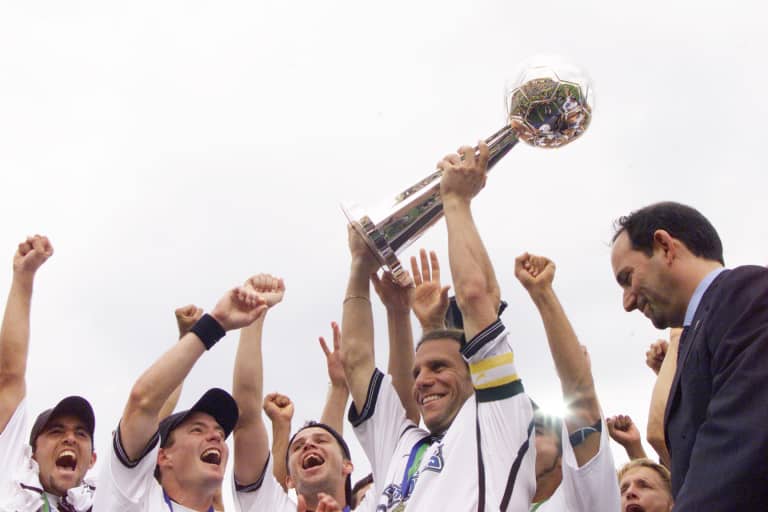
The San Jose organization was established in 1994, when San Jose became a charter member of Major League Soccer on June 15. San Jose joined Boston, Columbus, Los Angeles, New York/New Jersey and Washington, D.C. as the first teams in MLS. Between November, 1994 and June 1995, Tampa Bay, Denver, Kansas City and Dallas were added as clubs and the San Jose team was assigned to the Western Conference.
The club began to take shape on August 1, 1995 when a Bay Area soccer icon, Peter Bridgwater, was named the President and general manager of the team. Bridgwater previously served as the owner and general manager of the North American Soccer League version of the San Jose Earthquakes, and was one of the founders of the Western Soccer Alliance in the mid-1980s. Bridgwater was also the Venue Executive Director for the San Francisco venue of World Cup 1994.
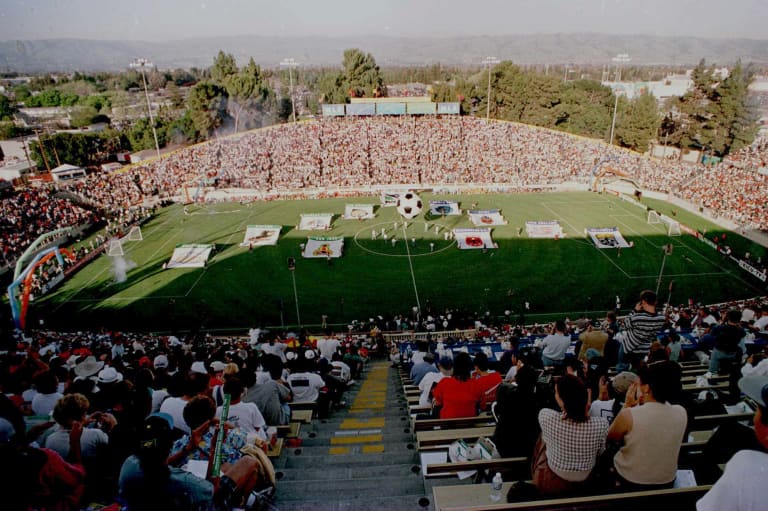
The San Jose MLS club began its history nicknamed the "Clash," a moniker it kept for four seasons before changing the name of the organization to "Earthquakes" prior to the 2000 season, embracing the name of the former NASL franchise that had been successful in the area throughout the 1970's and 1980's.
Laurie Calloway was named the first head coach in San Jose history December 7, 1995. Soon after, Calloway announced the first two members of the San Jose club: Bay Area native and U.S. National Team veteran John Doyle and Nigerian World Cup veteran Michael Emenalo.
1996: EXCITEMENT IN SAN JOSE
Throughout the early stages of 1996, San Jose remained busy attempting to field their first squad in the organization's history. The club received a huge boost when it was allocated U.S. National Team leading scorer Eric Wynalda on January 23, just one day after he became the all-time leading goal scorer in U.S. National Team history.
The team continued to take shape, as Paul Bravo was the club's first ever draft pick February 6 in the inaugural MLS Draft. Eleven days later, San Jose was involved in the first trade in league history, sending Rhett Harty and a first-round draft choice to the MetroStars for defender Troy Dayak.
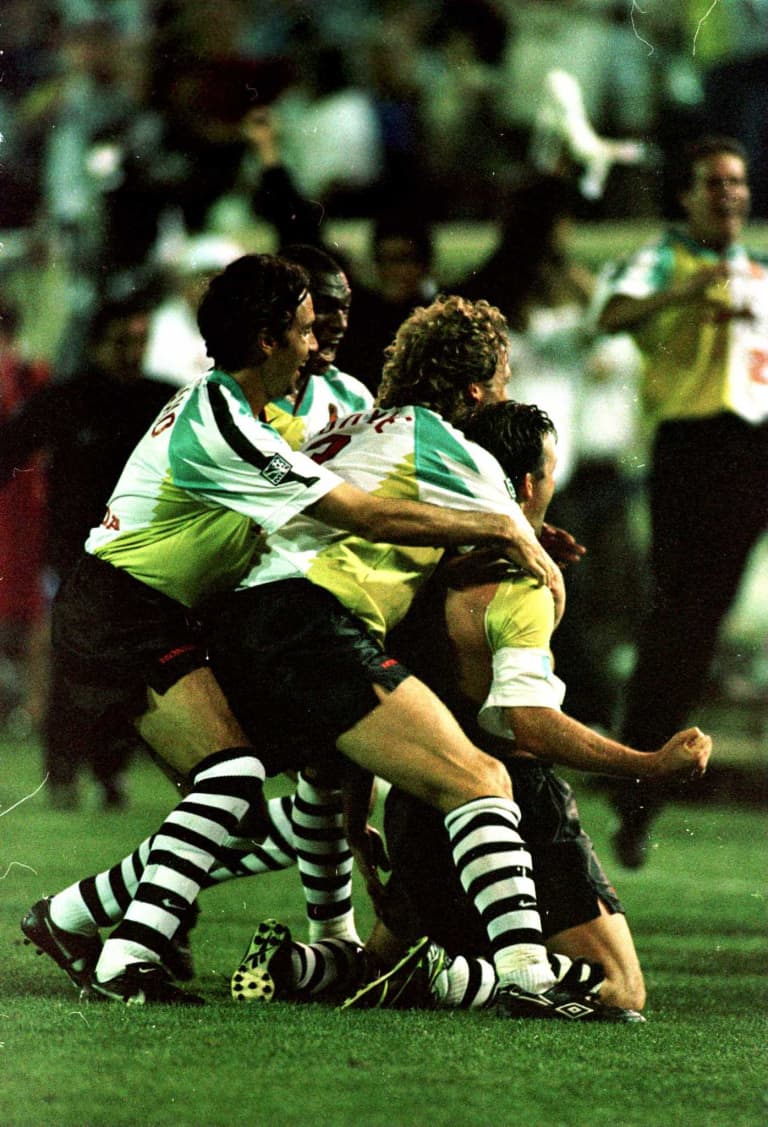
Soon after the first draft, Calloway convened the team on the south campus of San Jose State University on March 1 for the club's first-ever training camp.San Jose was once again an integral part of the launching of MLS, hosting the MLS' Inaugural Game at Spartan Stadium before a crowd of 31,683 on April 6. The then-record crowd did not go away disappointed as San Jose won its first game on the first goal in MLS history courtesy of Wynalda, defeating D.C. United 1-0. One month later, the club made history again, as they hosted the Los Angeles Galaxy in a match that drew 31,728 fans to Spartan Stadium, setting the record for attendance at a sporting event in the city of San Jose.
San Jose went on to finish their first season with a 15-17 record and a tough three-game exit from the playoffs by the eventual MLS runners-up Los Angeles Galaxy. It was a season that saw the club host the one millionth fan to attend an MLS game and record the first victory for an MLS team against an international opponent. The Clash defeated UNAM Pumas of the Mexican First Division 2-1 at Spartan Stadium June 12 to earn that distinction. Doyle went on to be recognized as the first MLS Defender of the Year after a stellar season, while also earning a spot on the MLS Best XI team. Missael Espinoza, a Mexican National Team standout, earned the Clash Budweiser MVP Award in that first season.
San Jose would continue with its international success, becoming the first MLS team to make a post-season international tour. The club split two games during a 13-day trip through China in late October and early November.
1997: A STAR EMERGES
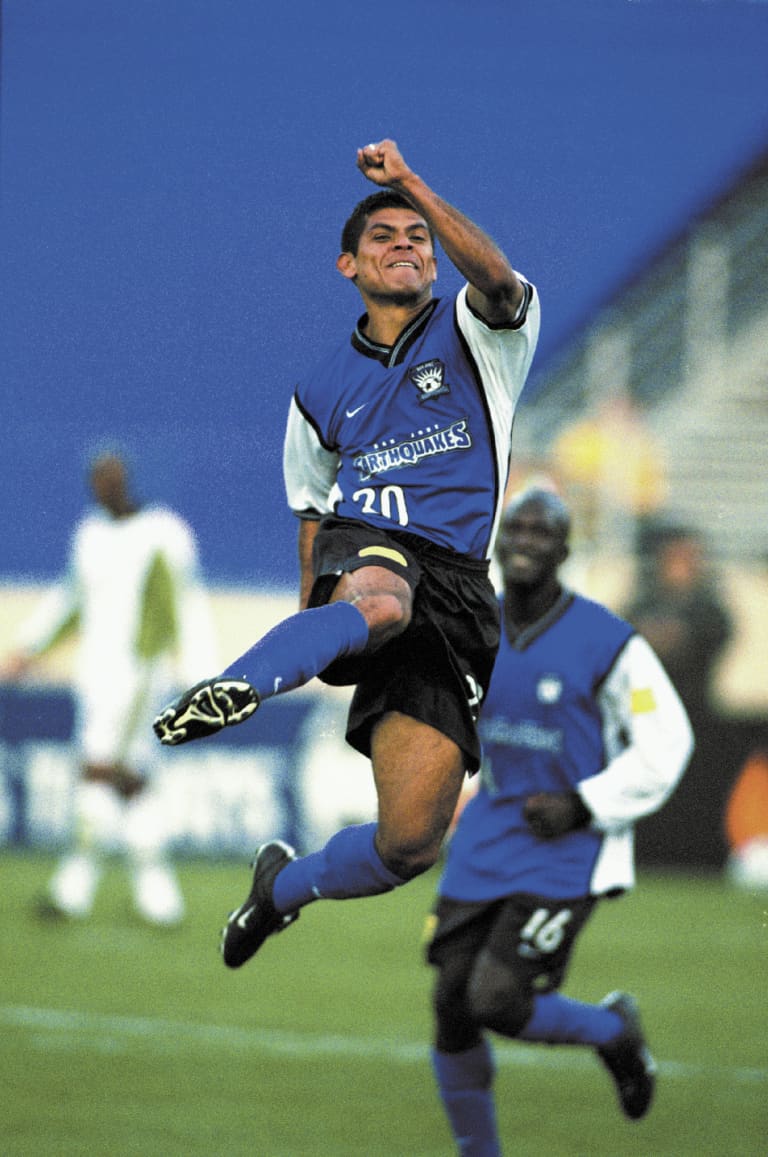
San Jose finished the 1997 season with a 12-20 record and failed to make the playoffs. The Clash played through a mid-season coaching change that occurred when Brian Quinn replaced Calloway on June 25, 1997. At the time, the 37-year old Quinn became the youngest coach in MLS history and he finished the '97 campaign with a 7-10 record.
The 1997 team was led by first-year MLS player Ronald Cerritos. Cerritos would go on to become a fan favorite in San Jose, playing with the team for six seasons and becoming the club's all-time leading goal scorer. The Salvadoran set both an MLS and San Jose record with his 11-game point streak during the season, which helped him to be named to the MLS Best XI. Notable members of the '97 club were former head coach Dominic Kinnear and U.S. National Team star Eddie Lewis, then a second-year MLS midfielder. San Jose also made its first appearance in the Lamar Hunt U.S. Open Cup in 1997, defeating the Central Coast Roadrunners in their first match, before bowing out in the next round of the historic competition.
1998: ANOTHER LEAN SEASON
The 1998 season was one of excitement tempered by frustration. Quinn led the team to a 13-19 record, good for 33 points in MLS. San Jose was forced to play the first three home games of the season at Stanford University after winter rains delayed the renovation on Spartan Stadium. When the club returned to Spartan, they faced the New England Revolution May 3, 1998 on a newly widened field that was 70 yards wide and 110 yards long.
Ronald Cerritos again led the team, putting in 13 goals to finish the season as the eighth leading goal-scorer in the league. During the 1998 season the pieces of the eventual 2001 MLS Cup Champions began to form at Spartan Stadium. Eventual 2002 MLS all-star Wade Barrett was drafted in the first round of the 1998 College Draft, and eventual 2002 MLS Goalkeeper of the Year Joe Cannon gained his first MLS experience. Cannon was called to the club from the A-League to serve as a back up for ten days before returning to soccer's minor leagues. Defender Richard Gough enjoyed an all-star season in 1998, as he was the only member of the team selected to play in the mid-season classic. The club was forced to play through May and June without forward Eric Wynalda, who was with the United States National Team at the World Cup in France. Wynalda appeared in two matches for the U.S. during the World Cup.
1999: THE KRAFT ERA BEGINS
For the first three seasons of the League's history, the San Jose club had operated as a league-owned team. That arrangement changed November 18, 1998 when the Kraft Group Sports, the investor-operator of the New England Revolution and owner of the NFL's New England Patriots, took over operations of the team. The change in ownership brought immediate change throughout the organization.
Kraft Group Sports assumed operation of the team January 4 and named Lynne Meterparel the general manager and Renato Capobianco as director of soccer. The 1999 season also marked the final year that the club would be known as the Clash, and the team retired the nickname by setting a club record for wins in a season with 19. Unfortunately, the team's 37 points saw them come up just short of a playoff spot for the third straight season.
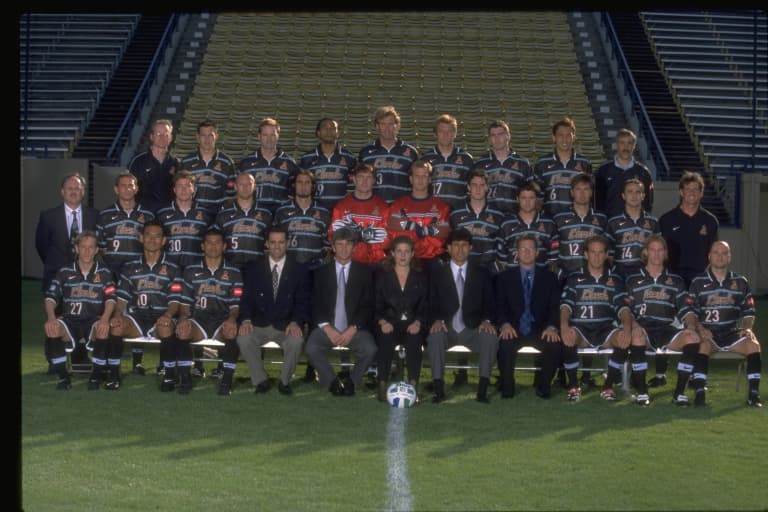
However, the team did place three players in the All-Star game, as Cerritos, Lewis and defender Mauricio Wright were selected. Wright knocked in the game-winning goal in the mid-season classic off a Cerritos assist in the 84th minute. The 1999 season also saw Cerritos break his own goal-scoring record with 15 and Lewis establish a new high mark for assists, registering 14.
Lothar Osiander became the third head coach of the team when he took over for Quinn on September 16 with five games remaining in the season. Assistant coach Jorge Espinoza guided the team to two wins before Osiander, the former U.S. National Team coach, was able to join the team from coaching the MLS Project-40 team for the final three matches of the year.
Despite missing the post-season, San Jose continued building for the future. The 1999 season was the first season for four key members of the 2001 MLS Cup Championship squad. Midfielder Richard Mulrooney, defender Jimmy Conrad, goalkeeper Joe Cannon and midfielder Scott Bower all debuted over the course of the year, establishing the solid foundation of the club. Mulrooney was a finalist for the MLS Rookie of the Year award.
With precocious rookies arriving, San Jose parted ways with a piece of its past, loaning striker Eric Wynalda to Leon of the Mexican First Division for the early stages of the season and then sending him to the Miami Fusion via the MetroStars June 1 as part of the "future considerations" from an early season deal.
Ronald Cerritos again led the team in scoring and finished as the third leading scorer in MLS with 15 goals and 39 points. His bicycle kick assist to Alejandro Sequeira Sept. 4 also earned him the Nickelodeon Play of the Year. He was also named the MLS Player of the Month for September when he scored four goals and notched four assists as the team battled for a playoff spot. Solid midfielder Eddie Lewis was named to the MLS Best XI, becoming the third San Jose player ever to be so honored.
2000: EARHQUAKES SHAKE SAN JOSE AGAIN
The 2000 season marked the return of a soccer club with the Earthquakes nickname to the Bay Area. San Jose played its first season under the Earthquakes moniker, revamping the organization under the name of the NASL soccer team that had been so popular in the area in the 1970's and early 1980's.
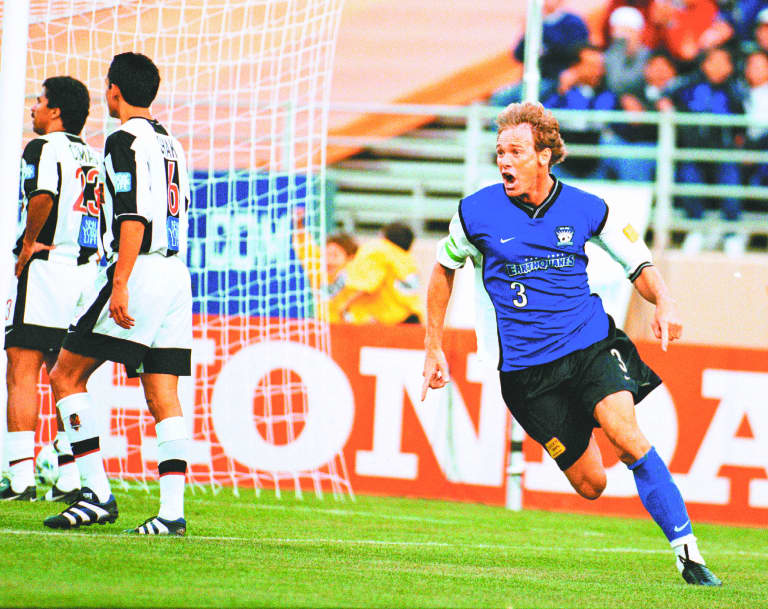
The 2000 edition of the Quakes was not immediately able to rekindle the glory days of the club, missing out on the playoffs for a fourth straight year and finishing the season with a 7-17-8 record in the first season that MLS games finished as ties. The season began with much promise after the allocation of Khodadad Azizi, a forward who played in the German Bundesliga and was the 1996 Asian Player of the Year. Azizi was selected to the All-Star team along with midfielder Dario Brose, but he managed to score just three goals in 20 games.
While Azizi and several new Quakes, including 2001 MLS Cup Champions Ian Russell and Jon Conway, were getting adjusted to the style of play under Osiander, San Jose was forced to part ways with one of its past stars. Eddie Lewis, the teams midfield star, was transferred to Fulham of the English First Division for a then MLS-record $1.5 million transfer fee.
While the team struggled at times, the Earthquakes did manage to set an MLS record with 15 straight unbeaten matches at Spartan Stadium. The streak stretched from Aug. 21, 1999 - July 15, 2000. It was a mark that the club would equal just two seasons later.
With a defense led by the emerging force of goalkeeper Joe Cannon, the Quakes recorded a club record nine shutouts in 2000. Long-time Bay Area soccer legend John Doyle played his last game as a member of the club in 2000, finishing a highly-decorated career that included eight years as a member of the U.S. National Team and a spot in the 1988 Olympics and 1990 World Cup. Doyle is still amongst the Earthquakes club leaders in numerous statistical categories, including appearances, games started, minutes played and cautions.
Forward Abdul Thompson Conteh was recognized as the MLS Humanitarian of the Year for his efforts to raise awareness and funds for the victims of war in his native Sierra Leone.
In a move that would foreshadow the dramatic upheaval the club would soon undergo, Lynne Meterparel stepped down as the Earthquakes General Manager on October 4 after 21 months.
2001: THAT CHAMPIONSHIP SEASON
After several years of frustration, the San Jose club was able to deliver a true season to remember for its fans in 2001, a season that ended with the club capturing its first MLS Cup Championship. It was a roller coaster ride right from the start when a new operating group was introduced in January and it accelerated with the addition of a savvy coach and the signing of the brightest American star the sport has ever seen.
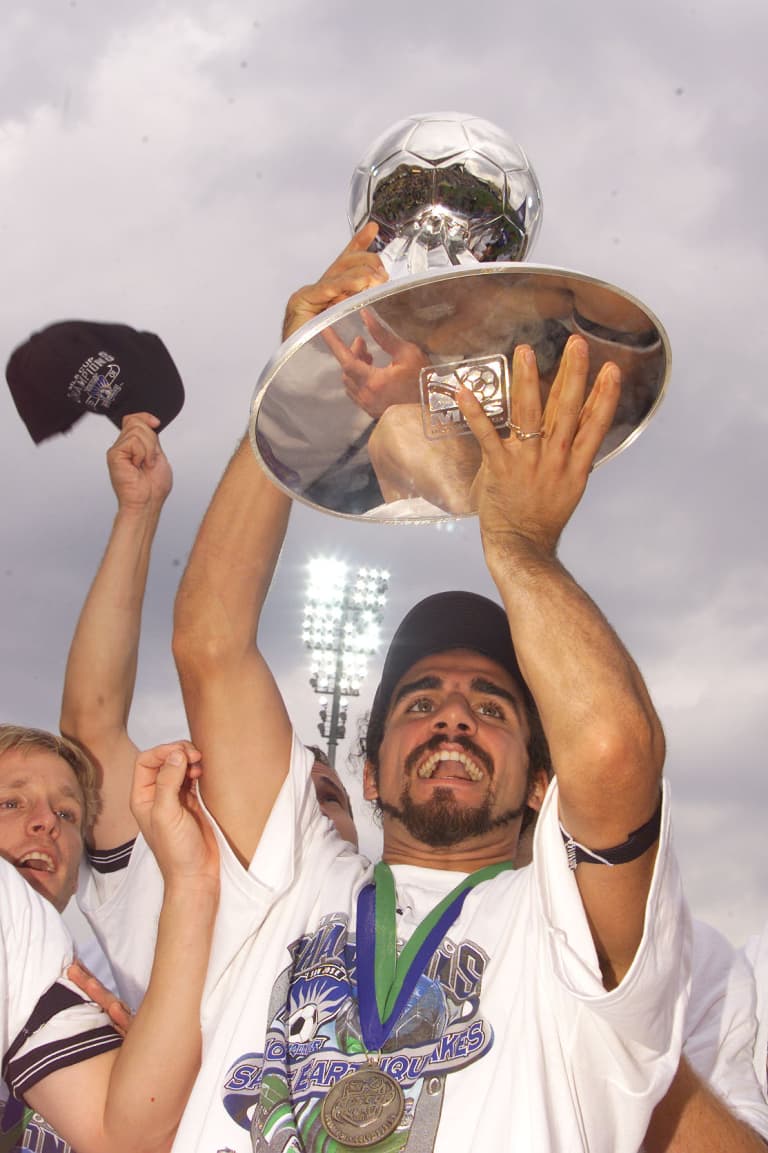
The San Jose Earthquakes experienced a re-birth in 2001 when it was announced that Silicon Valley Sports & Entertainment, the business and marketing arm of the NHL's San Jose Sharks, would become the operator of the club on January 10. In addition, Spartan Stadium was named the site of the 2001 MLS All-Star game the same day, and the stage was set for the Earthquakes historic season.
Just two days later, head coach Lothar Osiander was relieved of his duties. With the days leading to the draft and pre-season training rapidly approaching, Tom Neale was hired as the Earthquakes general manager Feb. 1. Frank Yallop became the fifth head coach in Earthquakes history when he was hired Feb. 2, giving him just two days in command prior to the MLS Superdraft.
Yallop wasted little time turning the Quakes into a contender, acquiring one of the league's best defenders, Jeff Agoos, from D.C. United in exchange for two draft picks and Abdul Thompson Conteh. Yallop then received defender Zak Ibsen in a trade from Los Angeles for a draft pick and acquired high-scoring A-League forward Dwayne De Rosario as an allocated player.
Yallop's busy week was not over, however, as he drafted six players in the Feb. 5 SuperDraft, including Chris Carrieri with the number one pick and defender Eddie Robinson with the 20th selection. Yallop was able to solidify the Quakes midfield when he acquired Manny Lagos from Tampa Bay in exchange for two draft picks.
With a revamped Earthquakes team coming into focus, former Earthquakes player Dominic Kinnear was hired as an assistant coach Feb. 15. The coaching staff was also bolstered by the return of goalkeeper coach Tim Hanley, who had served in the same capacity from 1997-1999. Seven days after Kinnear's hiring, another important piece of the 2001 Earthquakes came together when Ramiro Corrales rejoined his original club, coming over in a trade with the MetroStars.
Perhaps the biggest announcement in Earthquakes history took place on March 29, when it was announced that then 19-year-old superstar Landon Donovan would join the club as an allocated player. Donovan, from Redlands, Calif., was well known in the soccer world, joining the Quakes from German Bundesliga club Bayer Leverkusen, with whom he signed a contract in 1999.
As the season was set to start with a sense of optimism never before experienced at Spartan Stadium, Yallop and the Quakes made two more major moves, signing Danish star in Ronnie Ekelund and bringing defender Troy Dayak back to the team.
Dayak was an original member of the club in 1996 and appeared in matches in 1997-1998 before succumbing to serious surgery on a bulging disk in his neck that took over two years to fully recover from.
The Quakes got off to a slow start in April before tearing through an undefeated stretch from late April to early July (7-0-5) to establish themselves as one of the best teams in the league.
MLS recognized the Quakes firepower, as a team record six players were named to the MLS West All-Star team in July. A large crowd at Spartan Stadium watched the Quakes put on a mid-season show in the 6-6 game July 28. Ronald Cerritos, Joe Cannon, Troy Dayak, Manny Lagos, Jeff Agoos and Landon Donovan all represented the team, with Donovan taking home the MVP honors after thrilling the crowd with four goals.
Quakes general manager Tom Neale resigned a day before the All-Star game, but the team continued to roll along, finishing with a 13-7-6 record for the best winning percentage (.615) in club history. The team entered the final two games (both against the Los Angeles Galaxy) of the season trailing the Galaxy by two points in the Western Division standings. Tragedy struck the day the team was set to travel to Los Angeles for the first of their final two matches, as the terrorist attacks on New York City and Washington, D.C. put the country on hold. MLS canceled the remaining regular season games and the Quakes finished second in the Western Division and fifth overall in MLS, their best finish in club history. Overall, the Quakes winning percentage improved by .271 from 2000 to 2001, the third highest increase from one season to the next in league history.
The Earthquakes made this playoff appearance count, rolling over the Crew in the MLS Cup Playoff quarterfinals in two games, 3-1 and 3-0. The Quakes then faced the owners of MLS' best regular-season record, the Miami Fusion in the semifinals.
It was a hard-fought series, with Miami striking first with at 1-0 win in the first game off a goal in the 53rd minute from Preki. San Jose responded in the second game with a resounding 4-0 win at Spartan Stadium, setting the stage for one of the biggest games in Quakes history at Lockhart Stadium in Fort Lauderdale, Fla. on October 17.
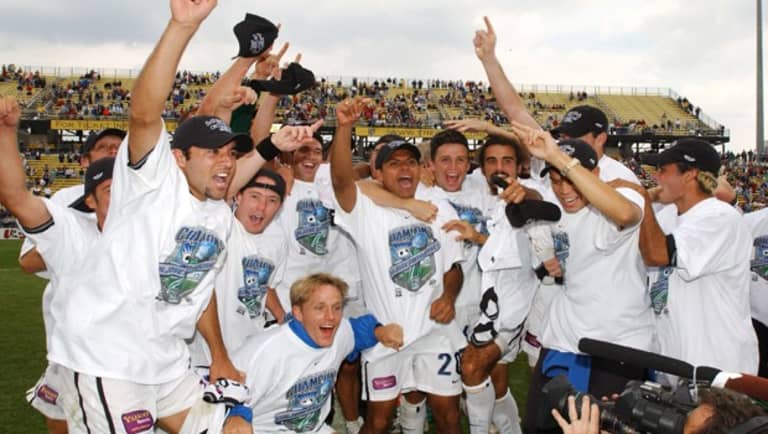
The game was a tight, pressure-packed affair that headed into overtime deadlocked at zero. It remained that way until four minutes into the extra session when Richard Mulrooney curled in a corner kick from the right side. Standing on the back post in heavy traffic, Jimmy Conrad knocked the ball in the air toward the goalmouth, where a leaping Dayak powered the ball past Miami goalkeeper Nick Rimando for a 1-0 win and the Earthquakes first-ever trip to the MLS Cup Final.
It was an incredible week to be a member of the Earthquakes as the club prepared for MLS Cup 2001 in Columbus, Ohio against their in-state rival Los Angeles Galaxy. In his first season as head coach, Frank Yallop was recognized for turning the club around from its last place finish in 2000 to the MLS title game with the Coach of The Year Award. First year Quake Jeff Agoos was named MLS Defender of The Year and a member of the MLS Best XI while Troy Dayak won the Ace Comeback Player of the Year Award for his dramatic recovery from neck surgery. As a team, the Earthquakes were recognized with the Fair Play Award.
MLS Cup 2001 would feature a similar Earthquakes sweep. Despite falling behind 1-0 on a Luis Hernandez goal in the 21st minute, San Jose responded with a world-class strike by Donovan in the 43rd minute. The team then won the first championship in club history on a golden goal by Dwayne De Rosario six minutes into overtime. De Rosario was rewarded with the MLS Cup MVP trophy, and the Earthquakes were finally able to call themselves MLS Cup Champions.
2002: DEFENDING THE CUP
The Quakes began the 2002 campaign in an unusual position. For the first time they were among the league favorites to win the championship. The team was well positioned for another run at the title, as MLS Defender of the Year Jeff Agoos and star forward Landon Donovan were returning. The team also made a major off-season move as it sent all-time leading scorer Ronald Cerritos to the Dallas Burn for the Burn's top goal scorer Ariel Graziani on Feb. 8. On the same day, the Quakes announced that Johnny Moore would serve as the new general manager. Moore had strong roots in the history of San Jose soccer, having played for the NASL Earthquakes from 1974-1977, while also serving as assistant general manager from 1974-1976. In 1977, Moore became the first person to serve as a player and general manager at the same time, helping the Quakes rank among the leaders in NASL in attendance.
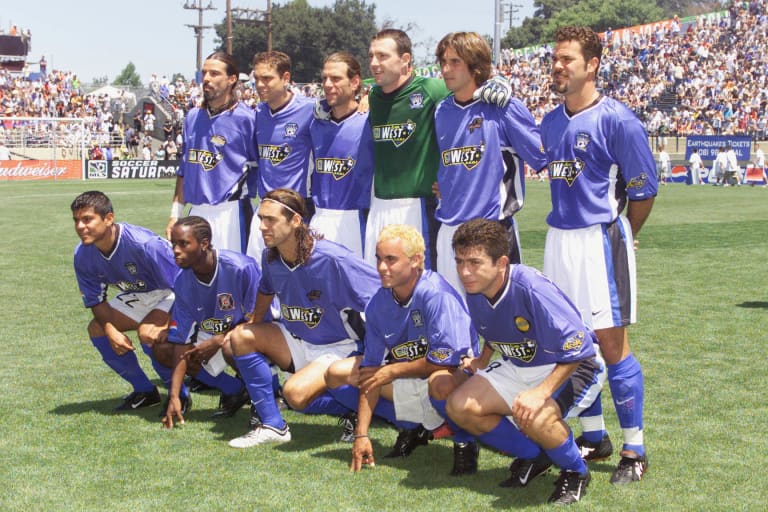
With Frank Yallop and Dominic Kinnear in charge, 2002 turned out to be another fantastic season for San Jose. The team held first place overall in MLS from April 20-Sept. 13 and posted an MLS all-time best home record of 12-1-1 at Spartan Stadium. The Quakes posted a then MLS record 12-game winning streak at Spartan and a 15-game unbeaten streak at home that tied their own home unbeaten streak. At the end of the year, the Quakes finished with the second-best record in MLS and equaled the club record for points in a season with 45.
The Quakes also participated for the first time in the CONCACAF Champions Cup, where they advanced to the quarterfinals. The team swept CD Olimpia of Honduras in the Round of 16 1-0 and 3-1, but could not get by Mexican champion Pachuca CF, who won the two-game series 3-1 on aggregate.
Individually a number of Quakes shined both internationally and in the league. Jeff Agoos and Landon Donovan represented the United States at the 2002 World Cup with Donovan starting every game and scoring two goals. The U.S. shocked the world by advancing to the quarterfinals.
At home, Wade Barrett and Ronnie Ekelund earned spots on the MLS Best XI team, while Joe Cannon was named MLS Goalkeeper of the Year. For the second straight season, six Quakes players participated in the MLS All-Star game (Jeff Agoos, Wade Barrett, Joe Cannon, Landon Donovan, Ariel Graziani, Richard Mulrooney). Frank Yallop earned the honor of coaching the MLS All-Stars in the game and his squad defeated the U.S. National Team 3-2. In 2002, Cannon set a club record with eight shutouts, while Graziani also broke a record by scoring six game-winning goals on his way to leading the team with 14 goals and five assists.
The playoffs were not as fruitful for the Quakes, however, as they were swept by the Columbus Crew, losing two games by 2-1 scores. Landon Donovan led the playoff charge with a goal and an assist, but his efforts were not enough as the Quakes were unable to defend their title.
2003: RETURN TO GLORY
After losing in the first round of the 2002 MLS Cup Playoffs, the Earthquakes went through a tumultuous off-season prior to 2003. Eight players left the team through trade or free agency, and the club re-loaded by bringing in nine new faces through the draft and shrewd trades. Starters Joe Cannon, Jimmy Conrad, Wade Barrett and Ariel Graziani would not be back for 2003.
The Quakes acquired Stanford All-American Todd Dunivant, 17-year-old Arturo Alvarez, Pac-10 Player of the Year Roger Levesque, forward Jamil Walker and goalkeeper Josh Saunders in the MLS SuperDraft. The team picked up Los Angeles Galaxy midfielder Brian Mullan in a trade, while also acquiring Craig Waibel (Waiver Draft) and Brian Ching (Supplemental Draft). After an injury to goalkeeper Jon Conway in preseason, Yallop and Kinnear signed Canadian National Team veteran Pat Onstad to man the net.
Yallop's squad had two setbacks prior to kicking off the regular season. First, CSD Municipal of Guatemala eliminated the Quakes from the CONCACAF Champions Cup in the round of 16 5-4 on aggregate. Second, projected starting forward Dwayne De Rosario, who had missed the preseason with a broken foot, suffered a torn lateral collateral ligament in his right knee and was expected to be out for the year.
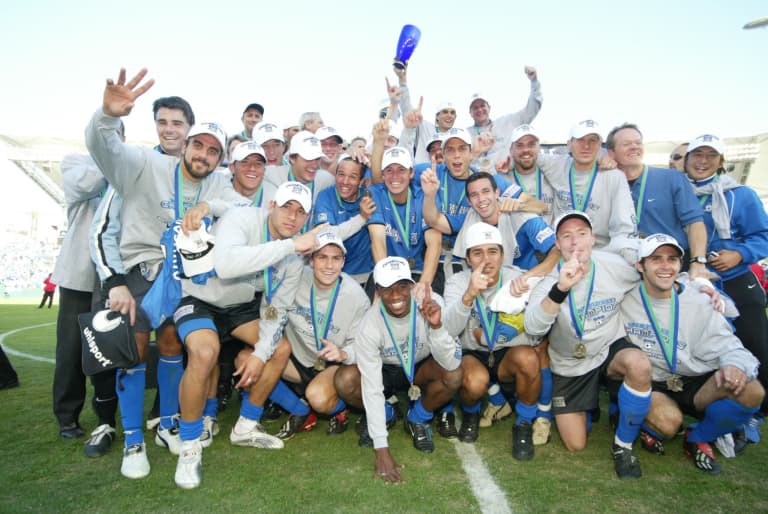
Despite the difficulties suffered in preseason, the Quakes surprised the League by bursting out of the gate with a 4-0-2 record in their first six games to claim the top spot in the Western Conference. The team, however, continued to deal with adversity as a number of players went down with injuries while Landon Donovan, Richard Mulrooney, Pat Onstad and Arturo Alvarez all missed time due to national team commitments.
Overall in 2003, the Quakes lost over 100 man games to injuries and national team call-ups, but they battled through and held the top spot in the Western Conference for every week but one. Contributions came from every player on the roster. Rookies Todd Dunivant and Jamil Walker each notched eight points, setting the single-season rookie scoring record, while Arturo Alvarez scored a goal in his first career start. Brian Mullan and Brian Ching put together career years with each netting six goals, while Craig Waibel, another former Galaxy player, put up career highs in games played and minutes played.
With strong efforts from everyone, San Jose captured its first-ever regular season Western Conference Championship with 51 points, a new club record. Pat Onstad and Landon Donovan were named to the Best XI team and Onstad was also recognized as the MLS Goalkeeper of the Year. The Canadian international re-wrote the San Jose record book for goalkeepers, setting the club record for shutouts (9), wins (14), catch/punches (117), games played in goal (27) and goals against average (1.04). He also found himself among the league leaders in most goalkeeping categories, placing first in catch/punches (117), first in shutouts (9), second in goals against (1.04) and second in wins (14).
Donovan and Dwayne De Rosario also had two defining moments in 2003 as they notched the first two hat tricks in club history. Donovan got things started by netting the first Quakes hat trick on Sept. 20 against Kansas City and then De Rosario followed the next week with a hat trick of his own against the Dallas Burn. De Rosario scored his first goal of that game 11 seconds in, setting the record for the fastest goal in MLS history.
In the MLS Cup Playoffs, the Quakes started slowly with a 2-0 loss to the Los Angeles Galaxy in the first game of a two-game aggregate goal series and then they fell behind 2-0 in game just 13 minutes into game two. Facing a 4-0 aggregate goals deficit, Yallop's squad responded with the tenacity and desire shown all season, as they netted four unanswered goals in regulation, capped by Chris Ronér's 90th minute header. Rodrigo Faria, who arrived in a late season trade, scored the overtime winner setting off a celebration at Spartan Stadium. The 5-2 comeback win has since been called the "greatest game in MLS history."
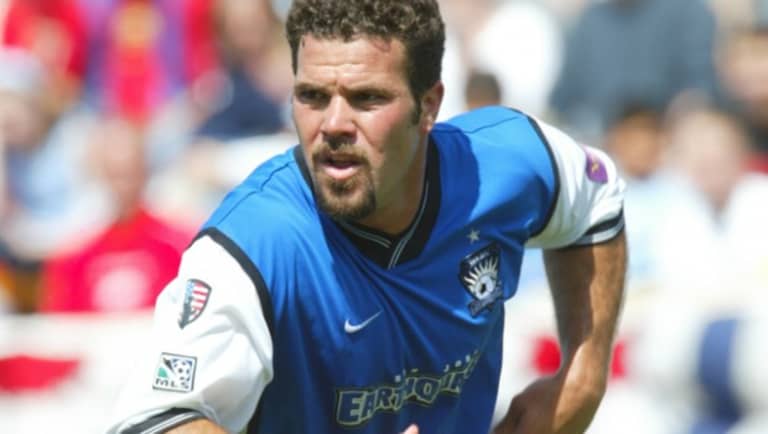
The Quakes continued their run to the championship, coming back just six days after the miracle against the Galaxy to record another memorable victory in the Western Conference Championship. Against the Kansas City Wizards, the Quakes twice recovered from one-goal deficits in the second half to tie the game and send it to overtime to the delight of 16,108 fans at Spartan Stadium. With only three minutes remaining in the overtime period, Landon Donovan sent the crowd into delirium with the game-winning goal off a pass from Ronnie Ekelund, giving San Jose its first-ever Western Conference Championship.
After coming from behind in their previous two playoff matches, the Quakes struck first in the MLS Cup against the Chicago Fire at The Home Depot Center. Ronnie Ekelund blasted a free kick past Fire goalkeeper Zach Thornton in the fifth minute, tying the MLS Cup record for the fastest goal in Cup history. Donovan stretched the lead to two goals by finishing off a Jamil Walker through ball in the 38th minute and the Quakes headed into halftime with a two-goal cushion. Onstad was outstanding in the first half with seven saves to hold Chicago scoreless.
The first 15 minutes following intermission saw back-and-forth action as three goals were scored during that interval and a penalty kick was called. DaMarcus Beasley scored for Chicago in the 49th minute, but Richard Mulrooney responded a minute later with a goal to stretch the lead back to two goals at 3-1. An own goal by Chris Ronér made it a 3-2 game and three minutes later Fire forward Damani Ralph was fouled in the penalty box to earn a penalty kick. Ante Razov stepped up to take the penalty and drove it to the lower left corner, but Onstad was there to make a momentum changing save. Donovan put the finishing touches on the Quakes second championship win in three seasons with a goal in the 71st minute from a Dwayne De Rosario cross. The Quakes four goals set and MLS Cup record, while the six combined goals were also a record.
The Earthquakes proved once again that they were the top team in MLS. From 2001-2003, San Jose has been the top team in MLS with two MLS Cup Championships and the best regular season record of 41-25-18.
2004: KINNEAR TAKES CHARGE
Despite coming off their second championship in three seasons, changes at the top were the big story heading into the 2004 season. In December 2003, head coach Frank Yallop stepped down from the Quakes to take over the Canadian National Team. In his place, the Quakes elevated assistant coach Dominic Kinnear to the top job and he brought in long-time San Jose player John Doyle to serve as his assistant coach. In late January 2004, changes continued as general manager Johnny Moore stepped down and was replaced by former U.S. World Cup star Alexi Lalas, who was named President and General Manager on January 27, 2004.
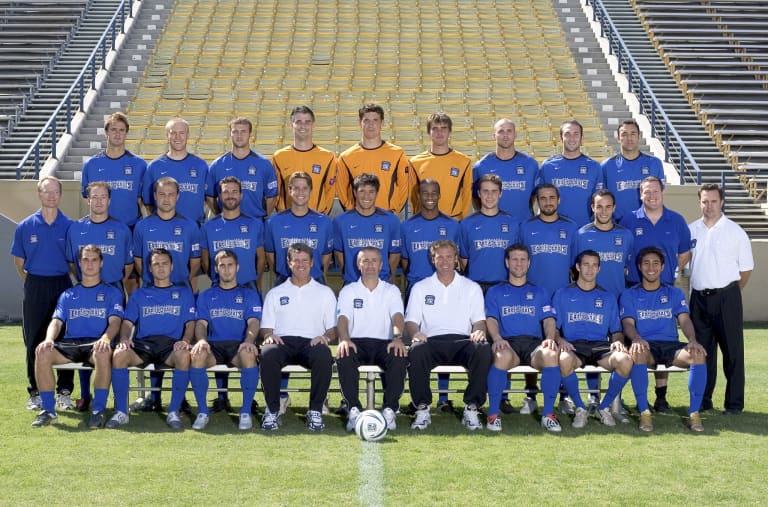
A successful draft by Kinnear and Doyle saw the team acquire local Santa Clara products defender Ryan Cochrane and goalkeeper Steve Cronin in the first round. The team also picked up midfielder Tighe Dombrowski from the University of Wisconsin-Milwaukee in the fifth round. Those draft picks served to bolster a team that brought back over 90 percent of the 2003 team. Manny Lagos, who was traded to Columbus for a third round pick, was the only starter not retained.
The 2004 season again saw the Quakes lose over 100 man games to injury and national team call-ups, and coupled with nine one-goal losses, San Jose finished 9-10-11 and fourth in the Western Conference. San Jose then faced Kansas City in the Western Conference Semifinals in a two-game series. After winning the first game 2-0 at home on goals by Dwayne De Rosario and Craig Waibel, Kansas City turned the tables in game two to beat the Quakes 3-0 and end their season.
While San Jose did not make it back to MLS Cup, the team accomplished a number of notable feats. It set club records by recording four straight shutouts from Aug. 14-Sept. 4, while also recording a club record 459-minute shutout streak. Kinnear's squad also broke the MLS record by going extending their unbeaten streak when scoring first at home to 46 games.
Individually, the Quakes had a number of outstanding performances and milestones. For the first time in club history, the Earthquakes had five players voted in as starters for the Sierra Mist MLS All-Star Game as Jeff Agoos, Brian Ching, Landon Donovan, Richard Mulrooney and Pat Onstad all earned spots on the West squad. Ching scored in the game on assists from Mulrooney and Donovan, but the West fell 3-2.
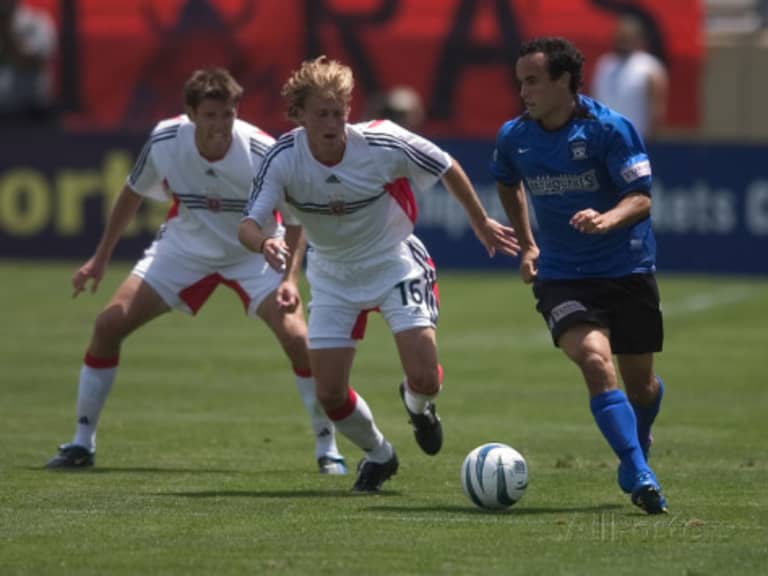
Ching had a breakout year after recovering from a torn Achilles in 2003, as he scored a league-leading 12 goals and notched four assists to earn MLS Comeback Player of the Year honors and a spot on the RadioShack Best XI team. In another historic moment, Mulrooney set the club record for assists against the Los Angeles Galaxy on May 22 and finished the year with 44 assists. Mulrooney finished 2004 as the all-time leader in six categories, including games played (163), minutes played (14,204) and fouls suffered (354), among others.
The off-season saw more change as the Quakes lost star forward Landon Donovan, who decided to return to Germany to play for Bayer Leverkusen, which had exercised the option to retain Donovan after his four years in MLS.
2005: THE SUPPORTERS' SHIELD
Coming off a disappointing 2004 season, head coach Dominic Kinnear helped return the Quakes to their winning ways in 2005, despite losing a number of long-time standout members of the club before the start of the season. Bringing in 18 new players, including returnees to the team, Ronald Cerritos and Wade Barrett, Kinnear led the Quakes to the greatest regular season in team history with an 18-4-10 record and 64 points clinching the club's first Supporter's Shield, despite losing over 100 man games to injury. Newcomers Ricardo Clark, Kelly Gray, Danny Califf, Mark Chung, Brad Davis and Alejandro Moreno all played big parts in the Quakes 2005 success.
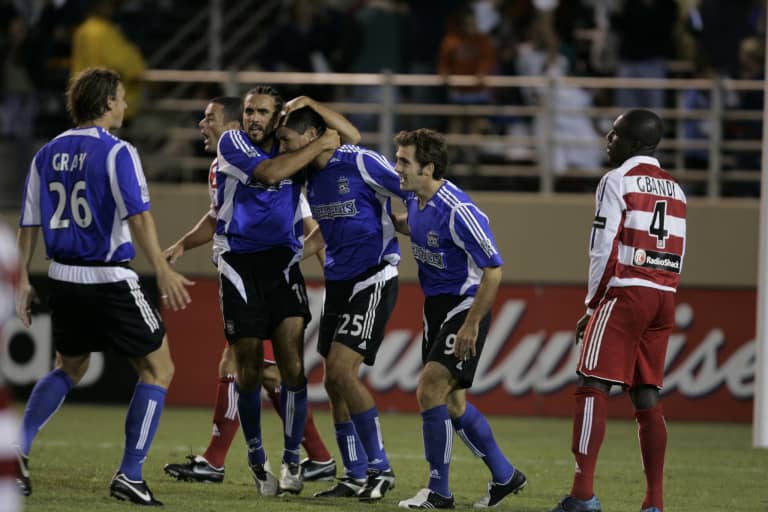
The team set the MLS record for the fewest losses in league history with four and became the second team in MLS history to surpass 60 points in a season. San Jose also set club records in the following categories: winning streak (6 games), road winning streak (6 games), shutouts (12), most road shutouts (4), most road wins (9), unbeaten streak (14 games) and most consecutive shutouts at home (5). Kinnear's squad became the first team in MLS history to finish the regular season unbeaten at home (9-0-7), while stretching their all-time unbeaten streak at home to 18 games, another MLS record. San Jose posted a +22 goal difference, the best in team history with 53 goals scored and 31 allowed.
Despite the great regular season success, the Quakes were eliminated for the second straight season in the Western Conference Semifinals. After losing 3-1 on the road to the Los Angeles Galaxy in the first leg of the series, the Quakes could not comeback and fell 4-2 overall on aggregate.
Dwayne De Rosario had the best season of his five-year MLS career in 2005 to lead the Quakes. Moving from forward to attacking midfielder, the Canadian international recorded career-highs in goals (9) and assists (9) and finished runner-up in the Honda MLS MVP race. He also earned his second straight Sierra Mist MLS Goal of the Year award for his spectacular free kick on Oct.15 against the Los Angeles Galaxy.
Also having standout seasons for the Quakes were goalkeeper Pat Onstad and defender Danny Califf, who were both named to the RadioShack MLS Best XI team. Onstad was also named the MLS Goalkeeper of the Year for a season in which he led the league in wins (18), shutouts (12), goals against average (0.97) and save percentage (77.2). It was the second Goalkeeper of the Year award for the 37-year-old Canadian, who also moved into first place in team history with his 27th career shutout on Oct. 1 against New England. Califf helped stabilize the defense after coming over in a trade with the Galaxy, appearing in 20 games and scoring two goals. Along with Eddie Robinson, Califf helped form the most formidable central defense tandem in MLS.
Cerritos, the all-time leading goal scorer in team history, made a strong return to San Jose in 2005, after spending three seasons away from the team. Cerritos finished the year with six goals and eight assists to push his all-time totals to 61 goals and 47 assists, both team records. Cerritos notched his record-breaking 46th assist on August 6 against the Columbus Crew.
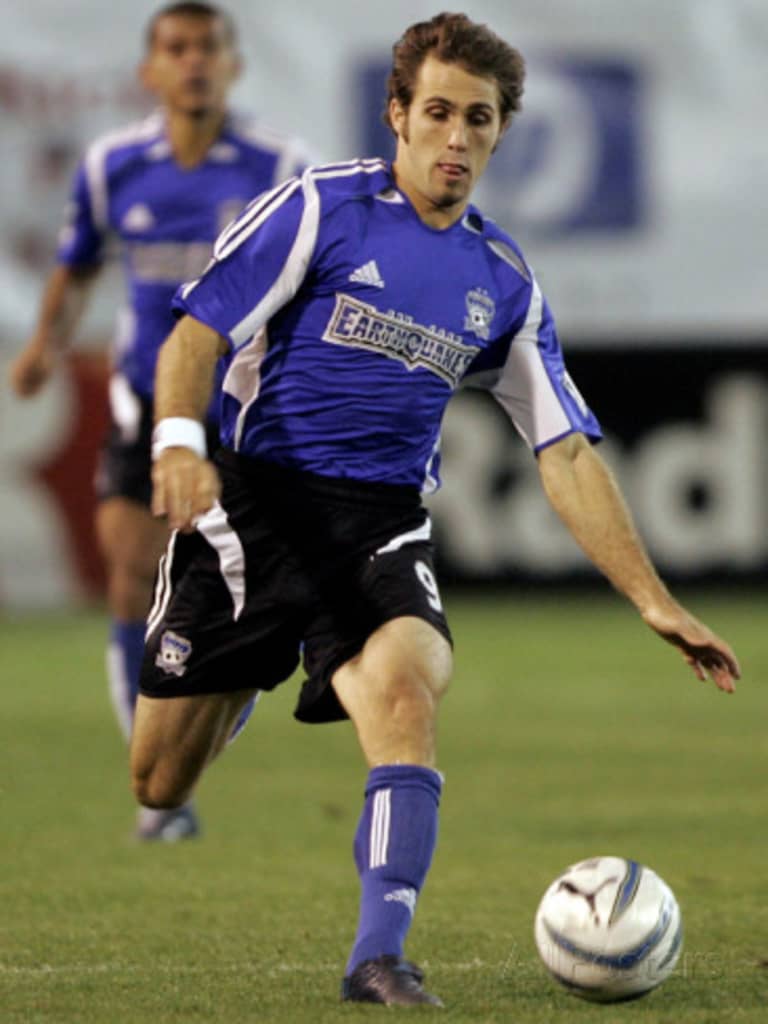
2005 also saw two original members of the team honored on the field at Spartan Stadium. The team inducted John Doyle as the inaugural member of the San Jose Earthquakes Hall of Fame, while Troy Dayak was honored in a post-game ceremony after announcing his retirement. Doyle's number was unveiled in Spartan Stadium along with a Hall of Fame banner at halftime of the team's Aug. 27 game against the Los Angeles Galaxy. Doyle was the first signing in the team's history on Dec. 7, 1995 and had a standout career with San Jose. The team captain during every year of his tenure, Doyle appeared in 132 games during his five seasons in San Jose and scored 11 goals and notched 15 assists. He was named the 1996 MLS Defender of the Year and made the MLS Best XI that year as well. The Fremont, Calif. native also earned a spot in the MLS All-Star Game in 1996 and 1997. Since his retirement following the 2000 season, Doyle spent three years as the color commentator on Quakes broadcasts before serving as the assistant coach in 2004 and 2005.
Dayak announced his retirement from the Earthquakes after spending eight seasons with the team and overcoming two potential career-ending injuries. Dayak played for San Jose from 1996-1998 and then returned to the team in 2001 after overcoming a severe neck injury that required surgery and torn knee ligaments. The former Livermore High School standout was a major factor in the Quakes 2001 MLS Cup Championship victory as he missed only one game in 2001 and was named the MLS Comeback Player of the Year, while also earning a spot on the MLS All-Star team. His overtime header against the Miami Fusion in the MLS Cup Playoff Semifinals sent San Jose to their first MLS Cup. Despite being hampered by injuries following that season, "The Beast" still helped San Jose win their second MLS Cup in 2003, while being one of MLS' elite teams in 2002, 2004 and 2005. He was honored on the Spartan Stadium field in a post-game ceremony on October 8, where he was presented a commemorative Earthquakes belt buckle.
On December 15, 2005, after the greatest regular season in team history with an 18-4-10 record and 64 points clinching the club's first Supporter's Shield, the Earthquakes were placed on hiatus by the League, with their players and coaching staff moving to Houston where they now play as the Houston Dynamo.
2006: THE REBIRTH BEGINS
On May 24, Lew Wolff, principal owner of the Oakland Athletics, purchased an exclusive option to acquire an MLS team and bring professional soccer back to the Bay Area. David Alioto was named the Executive Vice President of the San Jose Earthquakes.
2007: THE EARTHQUAKES RETURN
On July 18, Lew Wolff activated an option for the rights to the San Jose Earthquakes and Major League Soccer granted them a new expansion team. The club started to take shape on Oct. 3, when John Doyle was named General Manager of Soccer Operations. On the same day, the Earthquakes unveiled their new uniforms and team logo. On Oct. 26 the Earthquakes announced Buck Shaw Stadium in Santa Clara as their temporary venue for the 2008, 2009 and 2010 seasons with some games being played at McAfee Coliseum in Oakland.
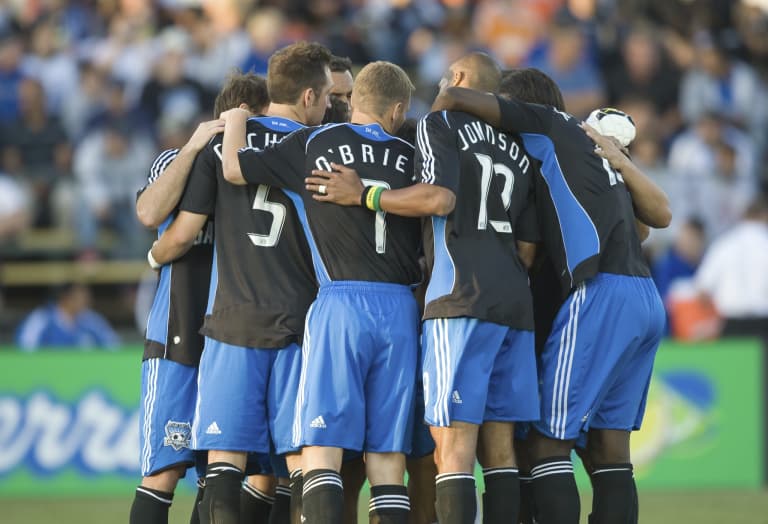
One of the biggest announcements for the new expansion team came on Nov. 5 when the Earthquakes named Frank Yallop their head coach. With Yallop aboard the Earthquakes selected ten players in the MLS Expansion Draft, including former Earthquakes defender Ryan Cochrane of the Houston Dynamo. Also selected were Clarence Goodson (FC Dallas), Ned Grabavoy (Columbus Crew), James Riley (New England Revolution), Joseph Vide (New York Red Bulls), Ivan Guerrero (Chicago Fire), Brian Carroll (D.C. United), Jason Hernandez (Chivas USA), Gavin Glinton (LA Galaxy), Chris Pozniak (Toronto FC). A few days later the Earthquakes acquired forward Kei Kamara from the Columbus Crew and goalkeeper Preston Burpo from Chivas USA. The Earthquakes then traded defender Brian Carroll to the Crew for Kamara and traded the club's fourth-round pick in the .2008 MLS Super Draft to Chivas USA in exchange for Burpo.
On Nov. 29, the Earthquakes brought another familiar face to the club by naming Ian Russell the assistant coach.
Toward the end of the year, the Earthquakes had open tryouts in seven cities across Northern California looking for local talent. The tryout tour began on Nov. 3 and finished on Sunday, Dec. 2 with over 600 players trying out. The tour visited Sacramento, Santa Rosa, San Francisco, Salinas, Oakland, Walnut Creek and Hayward. There were 33 players selected from the tryout tour that participated in the Earthquakes invitation-only combine. These players competed with other players from United Soccer League and from other top colleges in the country for a spot on the Quakes reserve division team.
2008: BEST EXPANSION TEAM OF THE DECADE
The San Jose Earthquakes started 2008 with a flurry of activity. On Jan. 10, they acquired goalkeeper Joe Cannon from the Los Angeles Galaxy. Soon after the team acquired defender Nick Garcia from the Kansas City Wizards in exchange for the No. 1 overall pick in the 2008 MLS SuperDraft and then selected Shea Salinas with the 15th overall pick in the MLS SuperDraft.
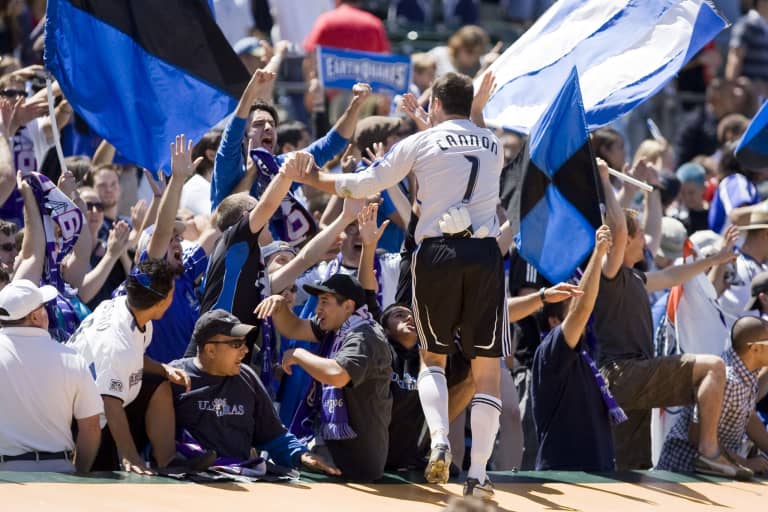
The Quakes reported for preseason at the beginning of February and officially made their on-field return to the Bay Area on February 13, in a 1-0 preseason loss to the old version of themselves, the Houston Dynamo, at PAL Stadium in San Jose. Another familiar face returned to San Jose soon after, as the Earthquakes acquired midfielder Ramiro Corrales from the Houston Dynamo in exchange for allocation money.
On Feb. 26, the Earthquakes named former Quakes midfielder Ronnie Ekelund the technical advisor. A day later, the team acquired midfielder Ronnie O'Brien from Toronto FC in exchange for a first round draft pick in the 2009 MLS SuperDraft and allocation money.
The Quakes kept on building the team and on March 13, Jason Batty was named the goalkeeper coach. At the end of the month, the team signed Shea Salinas and acquired forward John Cunliffe. Prior to the opener against the Los Angeles Galaxy on April 3, the Earthquakes signed Eric Denton, Jay Ayres, Matt Hatzke, Adam Smarte, Jamil Roberts and Ryan Johnson.
The team opened their home schedule in front of over 20,000 fans at the Oakland-Alameda County Coliseum against the Chicago Fire on April 12. The Quakes won their first match on April 19 with a 2-0 road victory over the Colorado Rapids. Another milestone came on May 3 when the team opened its new home on the campus of Santa Clara University, Buck Shaw Stadium. The Quakes played to a 0-0 draw in front of a sold-out crowd of 10,515.
While the Quakes were back on the field, the team was not able to find its rhythm until midseason. To bolster the attack, John Doyle and Frank Yallop signed English forward Darren Huckerby, MLS veteran forward Scott Sealy, former AS Roma midfielder Francisco Lima and former Earthquakes player midfielder/forward Arturo Alvarez. The new signings paid off and the team posted a nine-game unbeaten streak from July 12-Sept. 27, the longest unbeaten streak in the league in 2008 and the second longest ever by an expansion team. That run got the Quakes back into the thick of the playoff race, but they were not able to get climb all the way back up the standings and were eliminated from the playoff chase on the penultimate weekend of the season.
During the 2008 season, the team earned a number of memorable victories, including a 2-1 victory over the Houston Dynamo on May 22 at Buck Shaw Stadium, a last-minute 3-2 win over the Los Angeles Galaxy at Oakland Alameda County Coliseum, a 4-0 win over the New England Revolution and a 2-0 road win over the eventual MLS Cup Champion Columbus Crew. The Quakes capped the season with a 2-0 win over Toronto FC on Oct. 25. The team also set a single-game attendance record on June 14 against the Los Angeles Galaxy, as 39,728 fans packed into Oakland-Alameda County Coliseum.
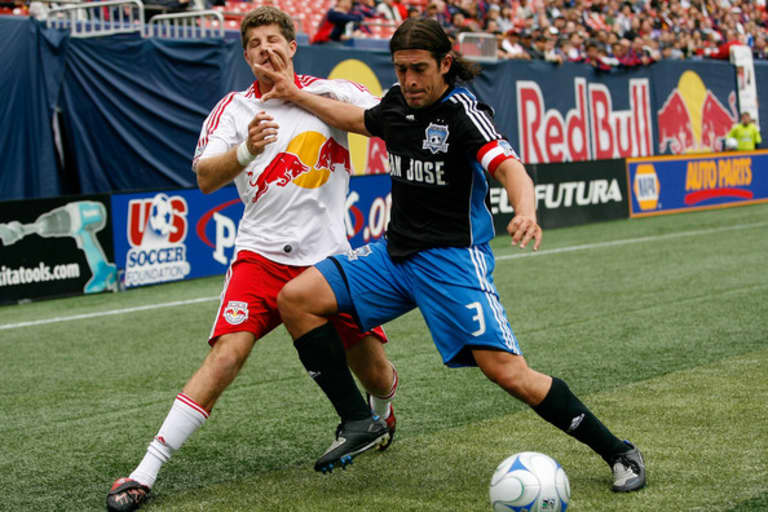
The Quakes saw standout performances from a number of players, including goalkeeper Joe Cannon and midfielder Darren Huckerby. Cannon led the league in saves and posted nine shutouts on the year and was also named the team's U.S. Soccer Foundation Humanitarian of the Year. Huckerby scored six goals and notched four assists in just 14 games to be named the MLS player of the month for September, MLS Newcomer of they Year and the Earthquakes Most Valuable Player. Jason Hernandez earned the team's Defensive Player of the Year award for his excellent play on the backline.
The Earthquakes made a very successful return to MLS as the top expansion team of the last decade. Under the guidance of head coach Frank Yallop, the Quakes had more wins (8), points (33) and goals (32) and allowed fewer goals (38) than any expansion team since 1998.
2009: QUAKES SHAKE THINGS UP
The 2009 campaign was one filled with injury and frustration for the Earthquakes. They finished 7-14-9 with 30 points under head coach Frank Yallop.The season began with new hope, coming off of a strong finish to the 2008 season that included a nine game unbeaten streak. Unfortunately, Yallop and the team had to deal with key injuries to Jason Hernandez and Darren Huckerby. This, along with other injuries spread throughout the starting eleven and led to a lot of shuffling and player movement. All in all, eight players from the roster on opening day were gone by the middle of the season. Players like Andre Luiz, Ramon Sanchez, Cornell Glen, Chris Wondolowski, Bobby Burling, Aaron Pitchkolan and Antonio Ribeiro were brought in mid-season to help bolster the team and set them up for a good run in the future. Once all of these components were together, along with mainstays like Ryan Johnson, Arturo Alvarez and Joe Cannon, the team began to play better and finished the year on a nice run.
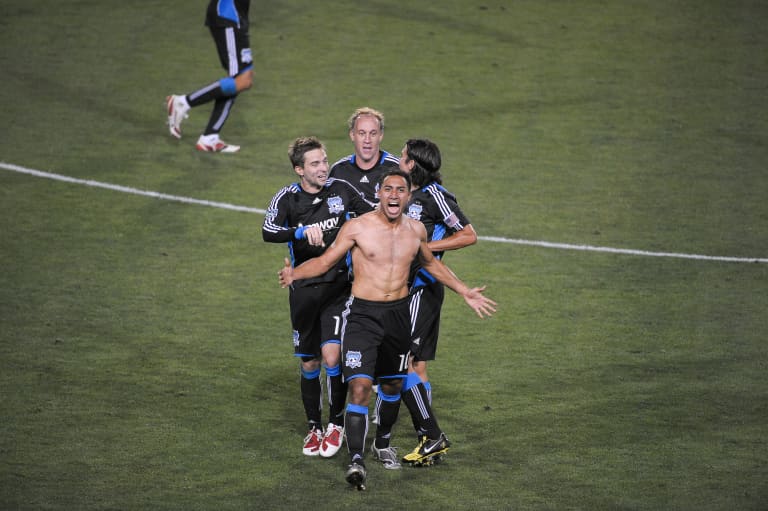
Ryan Johnson led the team with a breakout season in 2009, scoring a career-high 11 goals. Defender Chris Leitch, who was acquired early in the year from New York Red Bulls, led the team in assists with a career-high seven. Brandon McDonald broke through into a starting central back role during the middle of the season and solidified himself as a key part of the Quakes defense. He scored his first goal for San Jose, and just the second of his career, in a thrilling 2-2 draw in Los Angeles against Chivas USA late in the year. McDonald was rewarded with a call-up into US national team camp in January.
Another mid-season addition, forward Chris Wondolowski, provided some highlights in the Quakes good form at the conclusion of the season. He scored a stoppage-time winner at home against Kansas City on Aug. 22 and added the final goal in a 4-0 thrashing of Seattle Sounders FC on Aug. 8. Arturo Alvarez added flair to the Quakes attack, scoring five goals in the 2009 season. His goal against Real Salt Lake on May 30 was nominated and finished in the top 10 for MLS Goal of the Year. 2009 also marked a significant point in Alvarez’s career, as he was selected for the El Salvador national team for the first time. He appeared in five World Cup Qualifiers for his country, along with teammate and Salvadoran captain Ramon Sanchez, who appeared in all of the qualifiers.
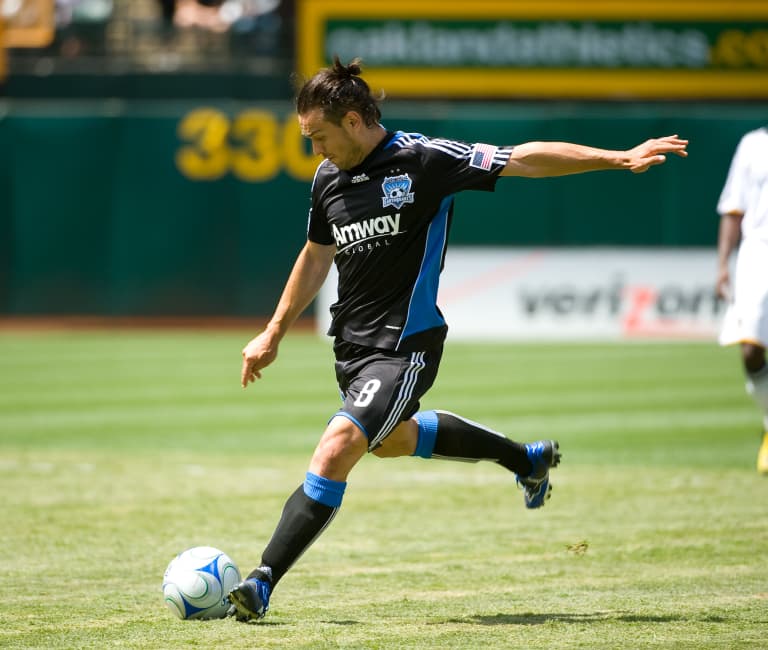
Two Earthquakes hit big milestones during the season, as goalkeeper Joe Cannon became the franchise leader in starts (159) and minutes played (14,481) and captain Ramiro Corrales became the franchise leader in appearances with 167, while also appearing in his 200th MLS game. Midfielder Darren Huckerby, who provided such a lift to the Earthquakes after his arrival in 2008, called an end to his career towards the end of the season after undergoing season-ending surgery. Huckerby was honored before the game on Oct. 3 in a 1-0 win over New York Red Bulls.
San Jose had quite a few memorable wins in 2009: knocking off Houston 3-2 at home for their first win of the year on March 28, a big 2-1 win over eventual MLS Cup Champion Real Salt Lake on May 30, a 2-1 win over eventual Western Conference Champion Los Angeles Galaxy in which Ryan Johnson scored the game-winner, a 4-0 domination of Seattle Sounders FC on Aug. 2, the 1-0 stoppage-time win over Kansas City on Aug. 22 and a 2-1 come-from-behind victory over D.C. United on the road on Sept. 27, which marked the first road win of the year and the first-come-from behind win since the team came back in 2008.
2010: QUAKES RETURN TO POSTSEASON
The 2010 season will be remembered for two things: San Jose’s return to the MLS Cup Playoffs and the emergence of Chris Wondolowski.
The year began with a preseason camp that included a 10-day trip to train at the grounds of club partner Tottenham Hotspur. The Earthquakes played three friendlies during the time abroad, winning games against the Tottenham Hotspur (1-0) and West Ham United (2-0) reserves as well as the Colorado Rapids (1-0).
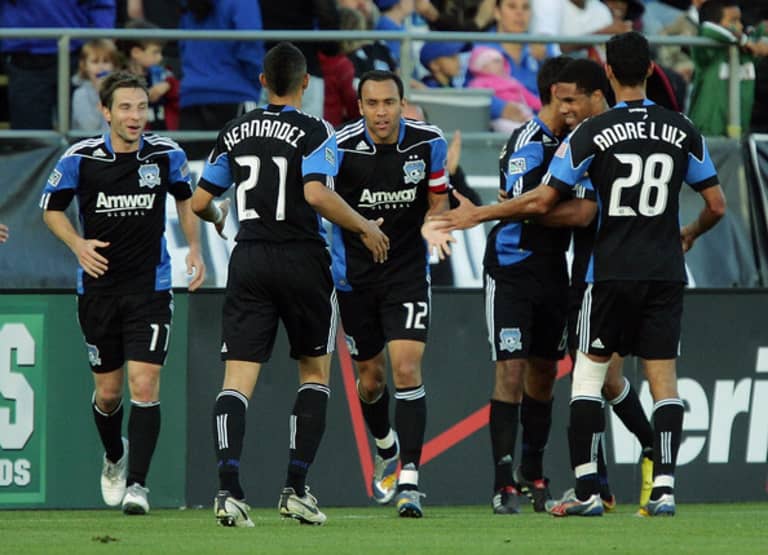
Building on a strong preseason, the Earthquakes jumped out to a 5-2-1 start over its first eight games. During that stretch, Wondolowski scored four goals in four games, a precursor to what would become an historic body of work.
In July, Tottenham Hotspur traveled to San Jose to train and play an exhibition against the Earthquakes. Two days before the match, over 1,200 fans attended a Spurs open practice session with players like Gareth Bale, Luka Modric and Robbie Keane on the pitch. On Saturday, July 17, a record crowd of 10,712 packed into Buck Shaw Stadium with more tuned in on ESPN2 to watch a spirited 0-0 draw.
One month later, the Earthquakes eclipsed the attendance record set against Tottenham Hotspur with 10,799 on hand for a thrilling 1-0 win against Southern California rival the Los Angeles Galaxy. As was the case in nine of San Jose’s 13 wins during the 2010 campaign, it was Wondolowski tallying the decisive blow.
San Jose’s win against the Galaxy was part of a 5-1-1 stretch that put the squad on the brink of clinching its first MSL Cup Playoff berth since returning to the league in 2008. On October 9, after two goals from Wondolowski gave the Earthquakes a 2-0 road win against DC United, the club officially sealed its spot in the postseason.
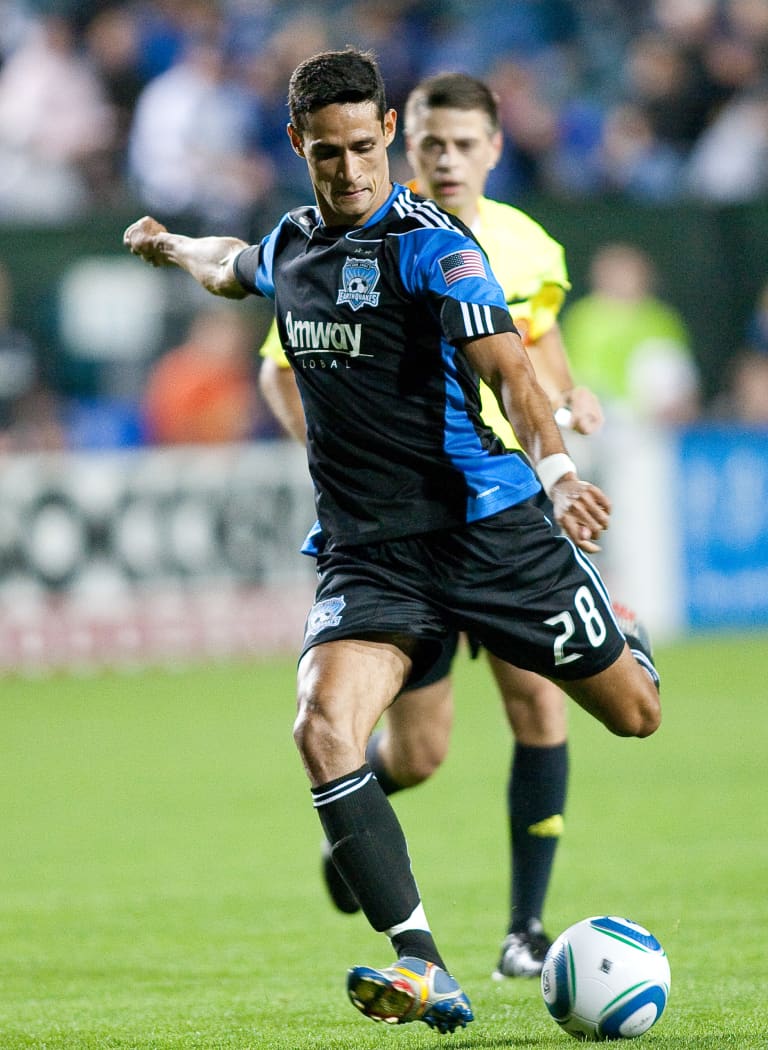
With a playoff spot secured, a different race heated up: Wondolowski’s chase for the Golden Boot. With Edson Buddle in command heading into the final week of the season, San Jose’s local product needed a small miracle to overtake the lead. That miraculous moment came on October 20 with Wondolowski coming off the bench to record a hat trick, leveling the race at 17 goals apiece. The drama continued as Wondolowski scored in San Jose’s 4-1 loss to Kansas City on Saturday, October 23 and Buddle yet to play. The next day, Buddle failed to find the net, sewing up Wondolowski’s comeback to win the 2010 MLS Budweiser Golden Boot.
From Sept. 15 to Oct. 23, Wondolowski scored all 10 of the Earthquakes goals, setting the all-time MLS record for the most consecutive goals scored by one player. Also, the Danville, Calif. native accounted for 52.9 percent (18 of 34) of the Earthquakes’ goals in the 2010 season, the second highest such percentage all-time in MLS history. Also of note, Wondolowski posted the third-highest scoring percentage in MLS history, scoring 25 goals on 111 shots (22.5%).
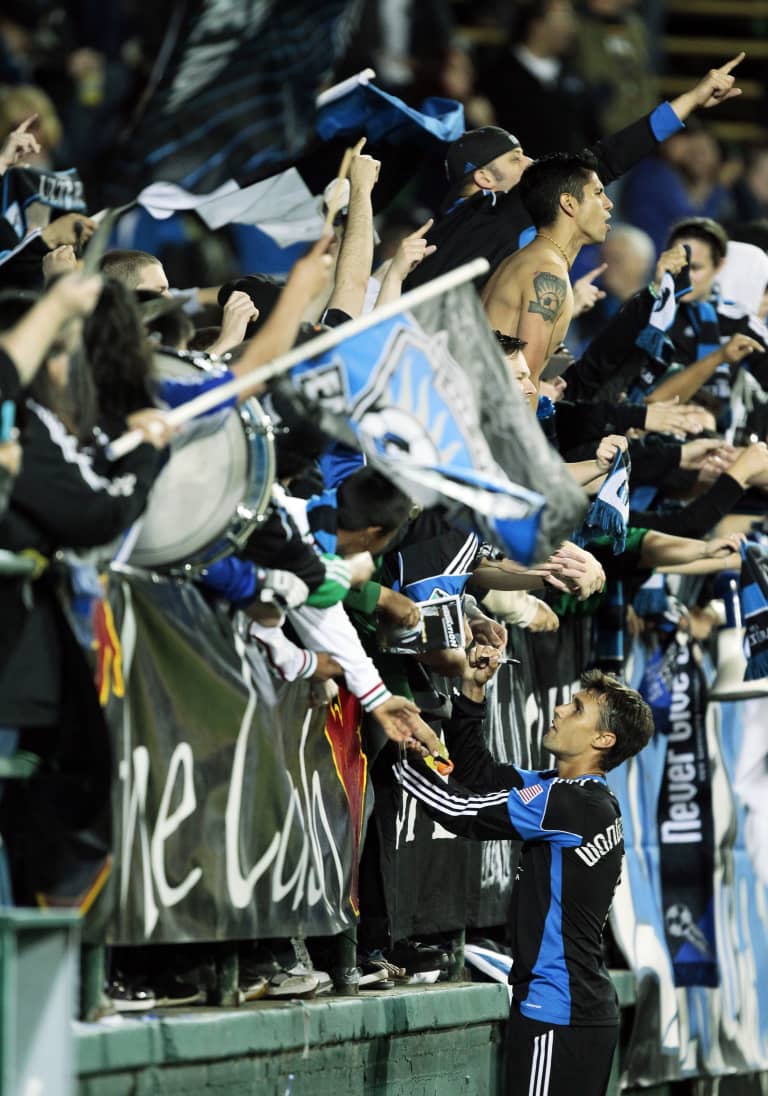
For his efforts, Wondolowski was named a finalist for the Volkswagen MVP along with Buddle and eventual winner David Ferreira of FC Dallas.
Regular-season accolades aside, the Earthquakes sought to make an impact in the MLS Cup Playoffs after drawing the star-laden New York Red Bulls in the Eastern Conference Semifinal. A Red Bulls squad bolstered by Thierry Henry, Rafael Márquez and Juan Pablo Ángel took a 1-0 lead in the aggregate at Buck Shaw Stadium. However, on the strength of a brace by 2010 MLS Comeback Player of the Year Bobby Convey and a series-clinching goal by Wondolowski, the Earthquakes advanced to the Eastern Conference Championship.
One week later, the Earthquakes bowed out of the MLS Cup Playoffs in frigid conditions against the Colorado Rapids at Dick’s Sporting Goods Park. Kosuke Kimura scored the lone goal for a squad that would go on to defeat FC Dallas 2-1 to win the MLS Cup Championship.
2011: WONDO SOLIDIFIES SPOT AMONG MLS ELITE
The 2011 season started on a positive note with reigning Golden Boot winner Chris Wondolowski earning his first call-up to the U.S. National Team. He played his first match for the Red, White and Blue in January before returning to training camp. The rest of the season did not play out in storybook fashion as the Quakes were shut out of the playoffs, but not before providing a number of great thrills throughout the year.
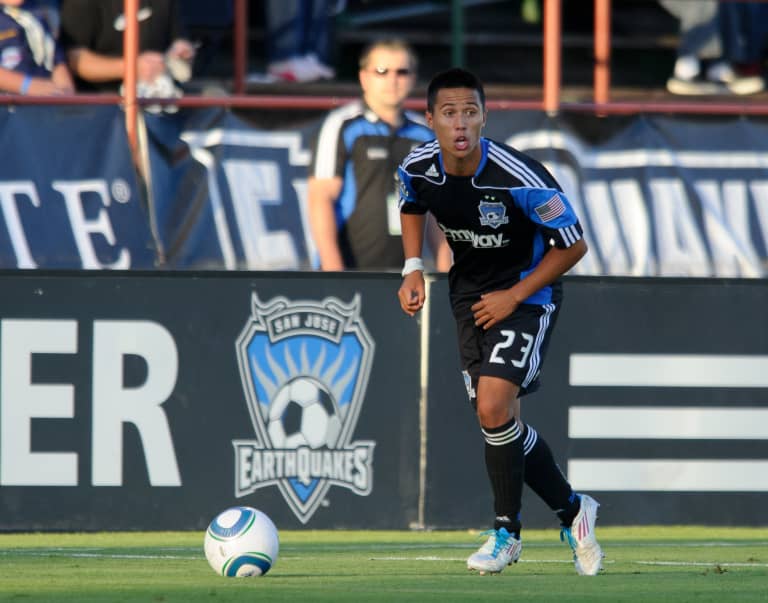
The majority of the 2010 team that reached the Eastern Conference Semifinals returned for 2011 season with a few new additions that would make a big impact on the squad. Forward Steven Lenhart arrived in a draft day trade from the Columbus Crew and Simon Dawkins was signed on loan from partner club Tottenham Hotspur. Lenhart and Dawkins went on to combine for 11 goals and five assists for San Jose during the year.
Opening Day against Real Salt Lake will not likely be a game that is forgotten soon. RSL won the match 1-0, but the game on the field was not what will stick in the minds of the people in attendance. A heavy rain started falling an hour before kickoff and did not let up until after the falling whistle had blown. Combined with gusts of wind and low temperatures, the game will forever be known as the “Great Deluge of 2011”.
After a slow start to the season, the Quakes righted the ship and had a 5-4-4 record after 13 games and were one of the highest scoring teams in the league. That start was capped off by Lenhart becoming just the fourth player in team history to record a hat trick with three goals against D.C. United on June 11. However, injuries, national team call-ups and scoring struggles conspired to lead to a 13-game winless stretch that knocked the team out of playoff contention.
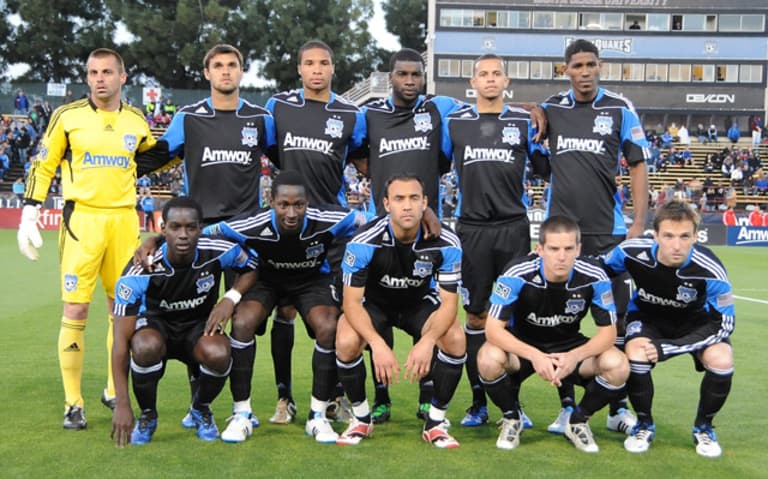
Despite the winless streak, the team did have a number of highlights in 2011. On July 2, the Quakes hosted the New York Red Bulls at Stanford Stadium in front of a crowd of 41,028, the largest single-game crowd in team history. Just 10 days later, backup goalkeeper David Bingham earned world-wide notoriety when his 90-yard kick ended up in the back of West Bromwich Albion’s net in an international exhibition. The goal generated nearly four million views on YouTube.
San Jose’s No. 1 goalkeeper, Jon Busch, put together a great season of his own, starting 33 of 34 matches and leading MLS in saves with 113.
The run-in to the end of the season also saw the race for the Golden Boot heat up again. After capturing the Golden Boot in 2010 with a strong finish, Wondolowski scored in the Quakes’ final five matches to finish the year with 16 goals, tying him for tops in the league.
Despite losing the title to Dwayne De Rosario by virtue of a tiebreaker, the Danville native became just the third player in league history to lead the league in goals one year and tie for the league lead the following year. He also passed former Quake Landon Donovan for second all-time in goals in club history with 37. Ronald Cerritos leads the club with 61 career goals. Despite missing the MLS Cup Playoffs, the Earthquakes set a new club record by closing the season with six consecutive sellouts.
2012: THE YEAR OF THE GOONIES
Heading into the 2012 season, there were not high expectations for the Earthquakes from MLS pundits around the country, as most picked San Jose to miss the playoffs. Despite the lack of preseason respect, Frank Yallop’s squad would prove everyone wrong and post one of the best seasons in league history.
The Quakes shot out of the gate with their best start ever at 7-1-1 and went on to shatter numerous club and league records with a 19-6-9 record for 66 points, while capturing their second Supporters’ Shield. The team broke the club record for points in a season (66), goals scored in a season (72, third highest total in league history), goals scored in second half stoppage time (nine, also broke MLS record) and goals scored after 75th minute (22, second highest total in league history). Their 11-win improvement from 2011 to 2012 marked the highest increase in MLS history.
While the numbers were impressive, what really made 2012 special was the blue-collar work ethic and never-say-die attitude of the team. With numerous comeback wins and last-second goals, the Quakes proved that they could never be counted out of any match. Ten times in 2012, San Jose allowed the first goal, but recovered to either win or tie. Their ability to comeback combined with a happy-go-lucky attitude earned the team a special moniker, “The Goonies”.
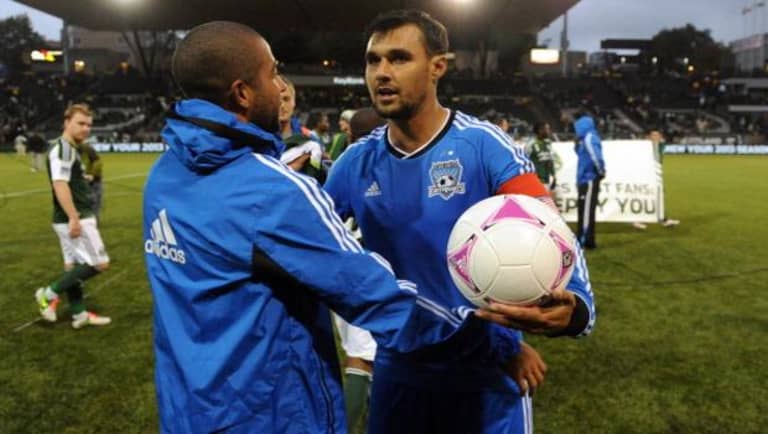
The group was led by a trio of high-flying forwards, Chris Wondolowski, Alan Gordon and Steven Lenhart. Wondolowski had a season for the ages, equaling the league record with 27 goals to become the first San Jose player to earn the MLS Most Valuable Player award. He also set a league record by leading the league in goals for three straight seasons to capture his second Golden Boot trophy. He also was named to the MLS Best XI for the third time in three years.
Complementing the deadly scoring ability of Wondo were the Bash Brothers, Alan Gordon and Steven Lenhart. Gordon had a career year with 13 goals and seven assists, while Lenhart also notched a career high with 10 goals. The Quakes also got a big lift from English midfielder Simon Dawkins, who scored eight goals, while dictating the tempo for the Quakes.
After their 7-1-1 start to the season, San Jose held off all challengers throughout the regular season and they were at their best against the best. They posted a combined mark of 8-0-1 against Real Salt Lake, Seattle Sounders FC and the LA Galaxy, their three closest pursuers in the Western Conference standings. The team clinched the Supporters’ Shield on the penultimate weekend of the season, following a Sporting Kansas City loss and a tie against their biggest rivals, the LA Galaxy.
Head coach Frank Yallop would earn MLS Coach of the Year accolades after guiding his team to its second playoff berth in three seasons. Additionally, defender Victor Bernardez became the second Quakes player named to the Best XI team.
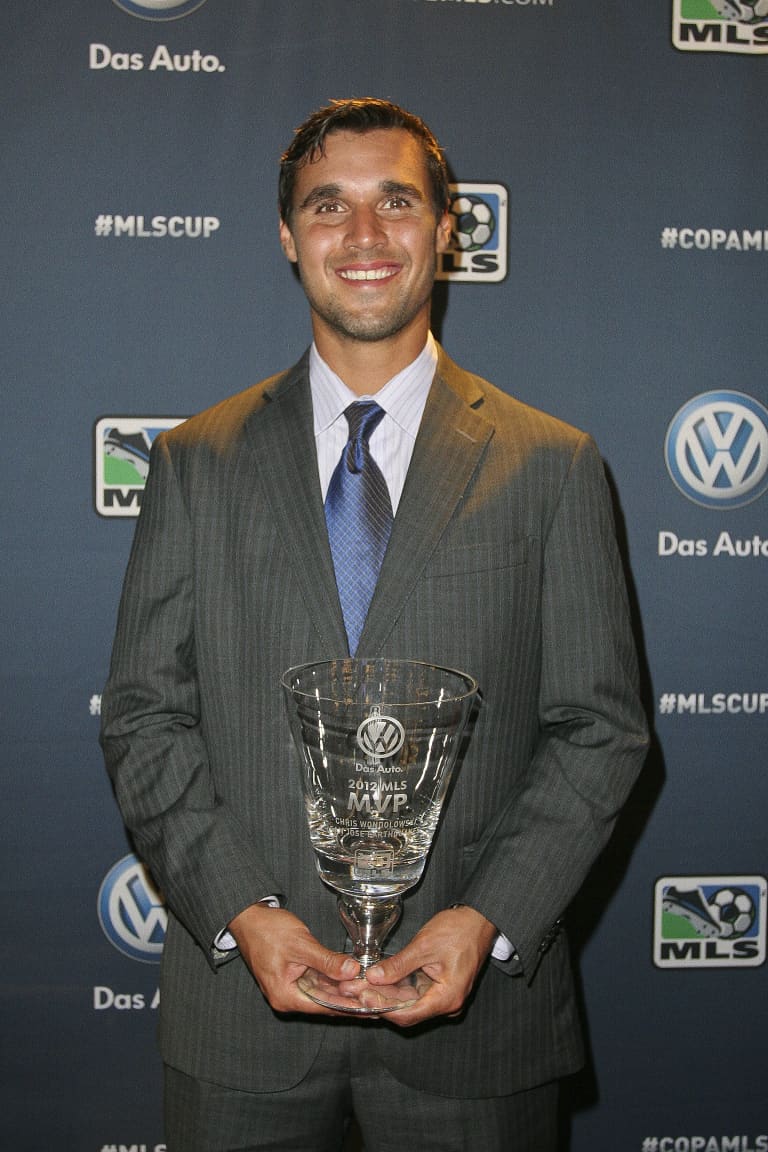
Following a thrilling regular season, the Quakes would square off against the Galaxy in the Western Conference semifinals. In the first leg of the series, the script would remain the same, as the two rivals were locked in a 0-0 tie late in the match. Bernardez then took matters into his own hands, blasting a long free kick through the Galaxy wall and just past LA goalkeeper Josh Saunders in the 94th minute. With a 1-0 lead heading into the second leg, it appeared San Jose was on the verge of a spot in the conference final. However, the Galaxy turned the tables on the Quakes in game two with three first-half goals on the way to a 3-1 win in the game and 3-2 aggregate goals win in the series.
Despite the heartbreaking defeat, the Quakes had re-established themselves as one of the league’s elite teams and they had captured the imagination of the Bay Area. 2012 truly was a year for the ages in the history of Quakes soccer.
2013: WATSON ERA BEGINS
The Earthquakes closed their 2013 campaign in prolific form, but narrowly missed the MLS Cup Playoffs due to the league’s second tiebreaker. They finished 14-11-9 with 51 points, tied for third-most in club history. The results were more impressive considering a midseason change at head coach following the departure of Frank Yallop on June 7, 2013. Taking over at the helm was Yallop’s assistant, Mark Watson, under the interim title.
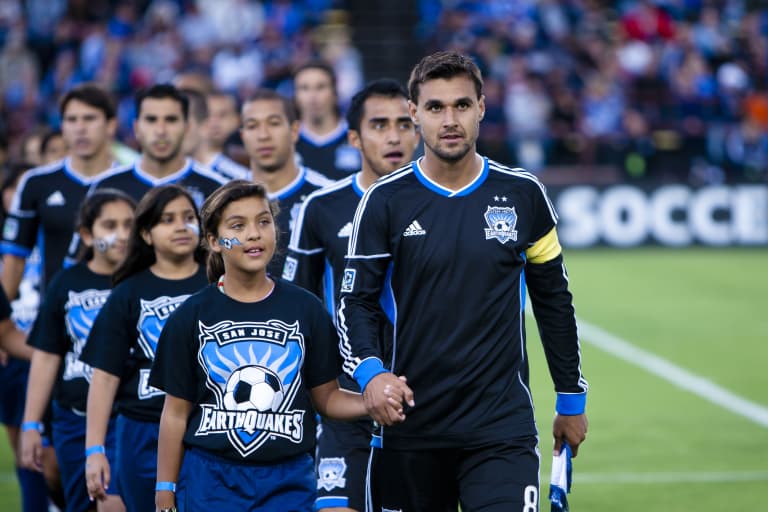
Under Watson, the Earthquakes rattled off an 11-5-3 record, tied for the best point-per-game average in the league during that stretch. They also advanced in CONCACAF Champions League, winning a group that also featured the Montreal Impact and Montreal’s CD Heredia. Over the last two months of the season, San Jose allowed just two goals in all competitions while rolling to a nine-game unbeaten streak. They went 430 minutes without yielding a goal before FC Dallas found the net in the final minute of the last game of the year, the second-longest streak in Earthquakes history.
San Jose’s last match of 2013 was also the sunset for MLS original Ramiro Corrales’ career. Corrales ended his career atop the club’s all-time lists for appearances (250), games started (228) and minutes played (20,188). Earthquakes teammates wore jerseys from Corrales’ 18 seasons as a player to commemorate him during a special ceremony before the final match of the season against FC Dallas on Oct. 26. He was also carried off the field by teammates after being substituted in the 71st minute.
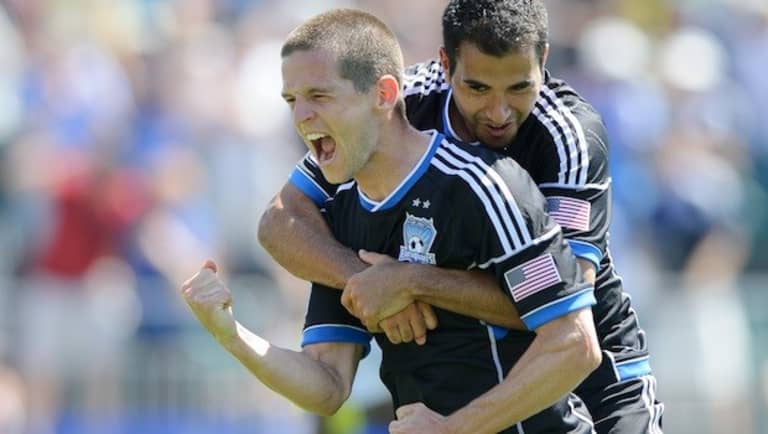
Among the other memorable moments in 2013 was the club’s match against the LA Galaxy at Stanford Stadium on June 29. In true never-say-die fashion, the Earthquakes rallied from a 2-0 deficit to knock off the Galaxy 3-2, the last two goals coming in the 92nd and 93rd minutes with San Jose playing a man down. The Earthquakes became the first team in MLS history to win a game that they trailed entering second-half stoppage time while playing a man down.
The match at Stanford Stadium sold out for a second-consecutive season with 50,028 in attendance. Sellouts were the norm as the Quakes set a new club mark by reaching capacity in 15 of 17 regular season contests.
2014: EARTHQUAKES ON A NATIONAL STAGE
The 2014 calendar year kicked off in spectacular fashion as the Earthquakes hosted an event with over 5,000 people to launch the reunification of the club’s brand. The Quakes unveiled a new logo and two new uniforms to celebrate the club’s 40th anniversary at San Pedro Square in downtown San Jose. With Mark Watson entering his first full season in charge, the Quakes entered the year with high expectations.
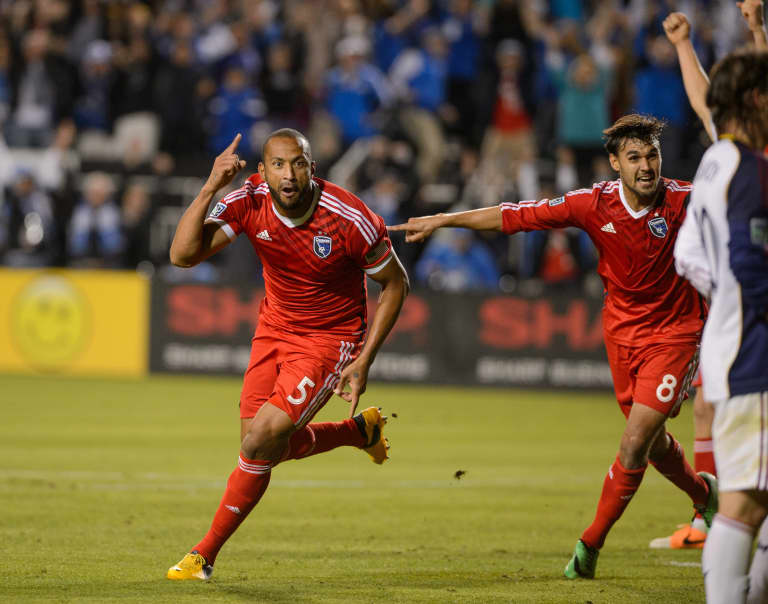
However, a slow start and a rash of injuries made 2014 an uneven year for the club on the field with the Quakes missing the playoffs for the second straight season. Despite the team struggles, the year had a number of individual highlights. Both Chris Wondolowski (United States) and Victor Bernardez (Honduras) represented their countries at the 2014 FIFA World Cup in Brazil. They are the first Quakes to play in the World Cup since 2002 when Landon Donovan and Jeff Agoos represented the U.S. Wondolowski helped the U.S. advance to the Round of 16, while Bernardez played in all three matches for Honduras.
Additionally, goalkeeper Jon Busch tied the single season San Jose record for saves in a season with 137, while tying the team record with 34 games played and 3,060 minutes played. Rookie homegrown midfielder, Tommy Thompson, made his first start for San Jose on Aug. 20, 2014 against Seattle Sounders FC to become the second youngest player to ever start for San Jose. The year also saw the end of the Quakes tenure at Buck Shaw Stadium on the campus of Santa Clara University.
San Jose saw numerous memorable moments at the stadium, including opening day on May 3, 2008 and clinching the Supporters’ Shield on Oct. 21, 2012. The Quakes had unbeaten streaks of 18 and 15 games during their time at Buck Shaw Stadium, losing just one out of 34 regular season games from the Sept. 10, 2011-March 15, 2014. Overall, the Quakes finished their Buck Shaw Stadium tenure with a 52-24-38 record in all competitions and a 45-22-35 record in MLS regular season matches. Near the end of the 2014 season, the Quakes let go of head coach Mark Watson and named Fremont-native Dominic Kinnear head coach for the second time in club history. Kinnear previously served as head coach from 2004-05.
2015: AVAYA STADIUM'S INAUGURAL SEASON
The headline heading into the season was the opening of the Earthquakes brand new, state-of-the-art venue, Avaya Stadium.
The 18,000-seat stadium provided Quakes fans with a sense of permanence and a proper home to call their own. The stadium opened to great fanfare and Krazy’s George’s drum on March 22 as San Jose defeated the Chicago Fire 2-1. Rookie Fatai Alashe scored the first goal ever at the stadium. The Quakes sold out all 15 MLS matches at Avaya Stadium, as well as three other soccer contests, during the inaugural season. The Earthquakes finished the year with a 7-3-5 record during league play at their new home. Overall, San Jose broke their club record for attendance with an average of 20,979, which includes matches at Levi’s Stadium and Stanford Stadium.
On the field, San Jose was coming off a six-win season, fewest in club history, but had made a wide array of moves in the offseason to strengthen the team. Among the more notable moves was bringing back head coach Dominic Kinnear, who led the Quakes to a Supporters’ Shield in 2005. He recorded his 150th win as an MLS head coach during the season. The club also signed Innocent, a Swiss striker, giving the roster three Designated Players for the first time in club history.
San Jose had a season defined by streaks. In July, the Quakes went 0-4-0 in MLS play and 0-7-0 in all competitions while forward Chris Wondolowski was away at the 2015 CONCACAF Gold Cup, but rebounded in August with a sparkling 4-1-1 record, which included a shutout streak of 448 minutes. Ultimately, the Quakes fell just shy of reaching the playoffs, although they more than doubled their win total with 13 wins and their 47 points were a 17-point improvement over 2014.
Wondolowski tallied a team-high 16 goals, becoming the first player in MLS history to reach a double-digit scoring total in six consecutive years. He also tallied his 100th career goal and 100th goal for San Jose during the season. He finished 2015 in fifth place all-time in MLS in goals scored with 109.
Stanford Stadium was once again home to another California Clasico with the Quakes setting another attendance record (50,422) in a 3-1 victory over the LA Galaxy.
Fresh faces largely impacted the Quakes season as a whole. The No. 4 pick in the 2015 MLS SuperDraft, Fatai Alashe, was a staple in the Quakes starting XI, as were defender Marvell Wynne and midseason signing Anibal Godoy. Forward Quincy Amarikwa was acquired via trade in late June, and finished with six goals, second most on the team. San Jose also handed the reins in goal to young keeper David Bingham, who responded by tying the 10-year-old club record with 12 shutouts.
While Wondolowski continued to suit up for the U.S. national team, the Quakes entire roster was full of internationals. Cordell Cato (Trinidad and Tobago), Sanna Nyassi (The Gambia), Anibal Godoy (Panama), Tommy Thompson (U.S. U-20 national team), Fatai Alashe (U.S. U-23 national team) and Marc Pelosi (U.S. U-23 national team) all represented their country during the year.
The Quakes also had the opportunity as one of three MLS clubs to compete in the International Champions Cup North America.
2016: SETTLING INTO OUR NEW HOME
The Earthquakes 2016 season was full of ups and downs, resulting in an 8-12-14 record and a ninth place finish in the Western Conference. The team’s 14 draws tied the franchise record set in 2011 and the team’s eight wins were tied for the second fewest since 2010.
San Jose started the season with tremendous promise, dropping just one of their first six matches (3-1-2). Unfortunately the season was marred with rough patches, including winning just one of their final 11 matches (1-6-4).
The Quakes defense built off of the previous year’s success and ultimately allowed just 40 goals, tied for third fewest in Major League Soccer. Center back Clarence Goodson, the club’s 2015 Defensive Player of the Year, made just two starts before sustaining a season-ending back injury, and young central midfielder Marc Pelosi also lost his season to injury, failing to make a single appearance after offseason knee surgery.
The team made a handful of midseason moves, including swapping Designated Player Matias Perez Garcia for Orlando City SC’s Darwin Ceren, and signing the Swedish Allsvenskan’s reigning Most Valuable Player Henok Goitom. The Quakes hoped Goitom’s arrival would spark the offense late in the season, but he ultimately finished with no goals and one assist in eight total appearances.
Avaya Stadium held the 2016 MLS All-Star Game against Arsenal FC of the English Premier League and forward Chris Wondolowski and goalkeeper David Bingham each featured in front of the hometown crowd. The duo also played a role for the United States National Team and Bingham even earned a shutout victory in his first career cap against Canada in February.
In August, the Earthquakes parted ways with general manager John Doyle, who held the role since the team returned to the league in 2008, and eventually replaced him with former Roma executive Jesse Fioranelli. The Quakes also continued to invest in their youth setup, agreeing to a multi-year affiliate partnership with USL side Reno 1868 FC beginning in 2016, and making strides on a 44-acre, $37-million academy complex down the street from the stadium.
2017: BACK IN THE PLAYOFFS
The Earthquakes entered 2017 with a reinvigorated spirit on the back of new general manager Jesse Fioranelli. Fioranelli, hired on January 5, brought in several new players with Targeted Allocation Money, including Albanian international Jahmir Hyka, Dutch striker Danny Hoesen and German defensemen Florian Jungwirth, all while keeping a Designated Player spot open for the summer. The club also signed their second-ever Homegrown Player in Nick Lima, who had previously played for the Quakes Academy, PDL affiliate Burlingame Dragons FC and the University of California. San Jose got off to good start, dropping just three of their first 10 games (4-3-3) and found themselves near the top of the table in the Western Conference. The Quakes then hit a rough patch, going 1-3-1 over their next five games, including a 4-2 home defeat to the LA Galaxy. Following the team’s 2-1 victory against Real Salt Lake on June 24, head coach Dominic Kinnear was replaced by the then technical director Chris Leitch, who made his First Team coaching debut one week later in the annual California Clasico at Stanford Stadium. Two late goals, including a stoppage-time winner by Shea Salinas, propelled the Quakes to a 2-1 comeback victory in front of 50,617 fans. Under Leitch, the Earthquakes experimented with their tactical approach and featured more attack-minded play through a variety of formations. The new tactical style provided mixed results leading to many important wins and several lopsided losses as the team pushed for second-half equalizers. The Quakes finished the regular season with a -21 goal differential. San Jose did well to hang around the playoff line through timely wins and avoiding lengthy losing streaks. The club also signed Georgia international forward Vako during the summer transfer window, who would go on to tally five goals and two assists in less than 800 minutes. In the penultimate game of the season, the Quakes earned a 1-1 draw in Vancouver to put their playoff destiny in their own hands, later clinching the playoff spot with a stoppage-time goal in the season finale. San Jose would play the single-elimination Knockout Round match in Vancouver, falling 5-0. The Earthquakes also had a strong run in the Lamar Hunt U.S. Open Cup, defeating the San Francisco Deltas (NASL), Seattle Sounders FC and the LA Galaxy at Avaya Stadium and earning a berth in the semifinals for the first time since 2004. The Quakes ultimately fell to Sporting Kansas City on penalty kicks after the score remained 1-1 through overtime. Chris Wondolowski, voted team MVP, led the Quakes with 13 goals and a career-best eight assists. He became the first player to ever score 10+ goals in eight consecutive seasons and moved into a tie for second on the league’s all-time scoring list. .
2018: A YEAR OF CHANGE
Under first-year head coach Mikael Stahre, San Jose started the year with an impressive 3-2 victory over Minnesota United FC, a match they once led 3-0. Despite the positive result in the season opener, the Quakes won just one of their next 20 matches (1-12-7), picking up a second win against Minnesota in Week 9 and failing to defeat any other MLS side until August. After signing Georgian defender Guram Kashia and moving 20-year-old midfielder Luis Felipe into the starting lineup, San Jose appeared to pick up steam midseason. The club earned a pair of upset victories over FC Dallas, who would finish with the Western Conference’s fourth-best regular season record, and began a promising 2-2-2 run from late July into August. The Earthquakes opted to part ways with Stahre and assistant coach Alex de Crook with six games remaining, promoting Steve Ralston to interim head coach. Ralston was tasked with facing four of the top five teams in MLS and the Quakes earned just one point the remainder of the season: a scoreless home draw against Colorado. San Jose’s primary storyline during the 2018 season was Chris Wondolowski’s pursuit of Landon Donovan’s all-time goals record. Needing 12 goals to reach 146 for his career and break the record, Wondolowski finished the season with 10, his fewest in a single season since 2009, but extended his record of consecutive seasons with 10+ goals to nine. Three Homegrown Players were signed prior to the season: goalkeeper JT Marcinkowski, defender Jacob Akanyirige and midfielder Gilbert Fuentes. Nearly all of the Quakes’ five Homegrowns made an impact during the year, with defender Nick Lima recording a team-high 3,049 minutes, midfielder Tommy Thompson making 14 appearances, Marcinkowski starting five of the team’s final six matches and Fuentes making his MLS debut on Oct. 21. Fuentes, at 16 years and 246 days, became the youngest player to debut for SJ. Just prior to the end of the season, the Quakes announced the hire of former Chivas head coach Matias Almeyda, who would take over beginning in 2019. He marked the team’s fifth head coach since June of 2017 .
2019: RESURGENCE AND REVIVAL
Under new head coach Matias Almeyda, the San Jose Earthquakes experienced a strong resurgence following the dismal four-win season of 2018. Despite making minimal changes to the roster, Almeyda set the tone for the year in preseason, taking players on a two-and-a-half-week camp in Cancun, Mexico, where they would train twice a day. The players were asked to learn an entirely different system of play, while aiming to be the fittest and most physically capable side in Major League Soccer. Despite scoring just minutes into their season opener, the Earthquakes fell to the Montreal Impact in what would be the start of a four-match losing streak to begin the year. Each of the four matches had a larger margin of defeat than the one before, culminating in a 5-0 loss at home to eventual Supporters’ Shield winners LAFC. Prior to the start of their fifth match, Homegrown Tommy Thompson gave a rousing pregame speech on live TV. He professed his belief in the team and exclaimed, “We’re going to fix this!” The Quakes would go on to defeat the Portland Timbers 3-0 for their first win of the season. The victory sparked an incredible turn of events for San Jose, who went 11-3-4 in 18 matches following the losing streak to start the year. It also marked the start of a 12-match unbeaten run at home (10-0-2), the club’s longest in six years. Chris Wondolowski, who entered the season just one goal shy of Landon Donovan’s career goal-scoring record of 145, failed to score in each of his first 10 appearances of 2019. After losing his starting spot, Wondolowski was named to the XI on May 18 for the first time in six weeks due to an injury to Danny Hoesen. He exploded for four goals against the Fire, breaking Donovan’s record and earning MLS Player of the Week honors. He would go on to score eight goals in four matches from May 18 to June 8 and force his way into the MLS All-Star Game against Atletico Madrid. Climbing as high as second in the Western Conference standings, the Earthquakes became the talk of Major League Soccer for their unique tactical approach and hard-working style of play. With six matches remaining, the Quakes were 13-10-5 and in strong position to finish top-four and host their first playoff game since 2012. Facing a difficult slate of opponents to close out the season, the Earthquakes were without head coach Matias Almeyda for four of the team’s last eight matches due to two separate sideline ejections. San Jose made many self-inflicted errors down the stretch, including receiving three red cards to key players across the final few matches. The Earthquakes ultimately lost each of their final six matches, including the season finale in Portland, which served as a win-and-they’re-in scenario. San Jose finished as the best non-playoff team in MLS for the third time in the past seven years. While only 20% of field-player minutes were given to newcomers in 2019, the Quakes were aided by a few important acquisitions. Cristian Espinoza, the team’s eventual Offensive Player of the Year, finished with a team-best 13 assists - something not previously achieved by a Quakes players since 2012. Defensive midfielder Judson and goalkeeper Daniel Vega also proved to be influential performers throughout the season. No player experienced a breakout season like 22-year-old Jackson Yueill, who went from role player to vital starter. The UCLA product established himself as one of the league’s best young players and earned numerous call-ups to the U.S. National Team in 2019.
History of the Earthquakes Name
When the San Jose Major League Soccer club decided to change its name and look in 1999, it went into the past to do so. Reaching back to a previously successful soccer team in the area, the Clash became the Earthquakes. The previous incarnation of the Earthquakes played in the North American Soccer League from 1974-1984, and then in the Western Soccer Alliance from 1985-88. Those Earthquakes teams called Spartan Stadium home. The name Earthquakes originally came from a newspaper contest in the San Jose Mercury News, in which fans were encouraged to send in suggestions for the name of the soon-to-be formed San Jose franchise. The name Earthquakes was chosen by the team's management. Following are the results of those teams:
Note: The team was known as Golden Bay Earthquakes in 1983 and 1984.
Year |
Record |
Finish |
|---|---|---|
1974 |
12-8 |
2nd Western Division (5 teams) |
1975 |
8-14 |
4th Western Division (5 teams) |
1976 |
14-10 |
1st Western Division (5 teams) |
1977 |
14-12 |
3rd Western Division (4 teams) |
1978 |
8-22 |
4th Western Division (4 teams) |
1979 |
8-22 |
4th Western Division (4 teams) |
1980 |
9-13 |
4th Western Division (4 teams) |
1981 |
11-21 |
4th Western Division (4 teams) |
1982 |
13-19 |
5th Western Division (6 teams) |
1983 |
20-10 |
2nd Western Division (4 teams) |
1984 |
6-16 |
5th Western Division (5 teams) |
Year |
Record |
Finish |
|---|---|---|
1985 |
4-1-2 |
1st (7 teams) |
1986 |
3-4-7 |
6th (7 teams) |
1987 |
5-5-1 |
3rd (6 teams) |
1988 |
7-5 |
3rd (6 teams) |
